#public domain sf
Text
It's true! I have a podcast, called Paper Cuts! The format is something I like to call Live Audiobook, where I go live, and read a book aloud to you, the audience! I then edit that down into what goes on the podcast feed.
Also, I have the book on screen during the stream AND it's in the vod, so people have a fallback to my automated captions!
We're live friday nights, generally, and specifically, this coming Friday, The 13th, is the launch of season 3 of the podcast! It's a new era for paper cuts, we're getting author permission for modern books to get air alongside the public domain classics that got us this far! I'm so excited to show off some more recently-made favorites of mine, and hopefully make some new favorites along the way, too!
Does the thought of a long backlog of episodes sound daunting to you? Don't worry about it, each time we start a new book, the episode is the title of the book, so there's plenty of places to start! We've done some of the big "english class" hits, like Dracula, The Cask of Amontillado, or The Picture of Dorian Grey, but also some weird little hidden gems I think you'll love, like The Five Jars, The Last Man, or even some issues of Astounding Stories!
Long story short, if you like audiobooks, you'll love them live, come drop by and enjoy Paper Cuts!
That's the link for when we go live!
And there's the podcast feed! (I'm also available in your podcatcher of choice, like spotify, or iTunes, for example!)
#Paper Cuts#Podcast#Public Domain#Dracula#edgar allan poe#sf serial#Live Audiobook#Astounding Stories#Analog science fiction#mary shelley#the picture of dorian gray#the last man#the cask of amontillado#the five jars#audiobook#audiobook narration#closed captions#(ok i think I've got the descriptive tags covered)#for real though I'm so SO pumped for season 3 of the podcast#there's some big gets as far as modern writing goes coming in the schedule#i even get to act as part of the promotional process for a brand new book that came out this week!#that's not even to mention the weird little PD gems i'm digging up#found some FUNKY stuff on gutenberg this time#tune in if you can#we're gonna have a blast#shameless self promotion#everybody votes website
11 notes
·
View notes
Text
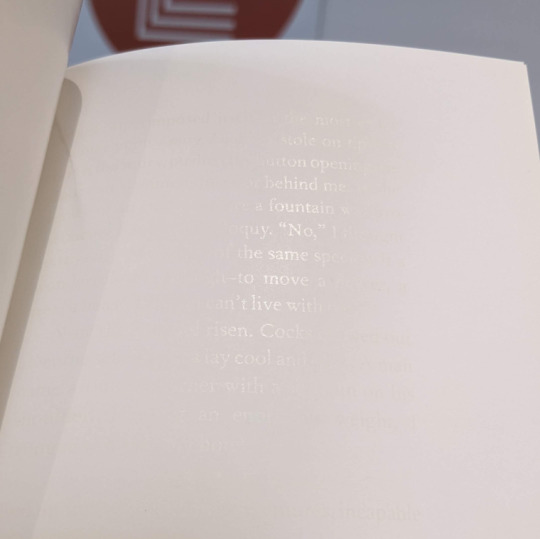
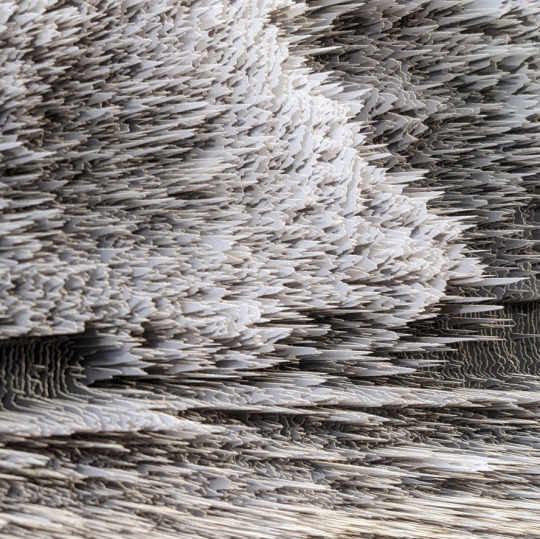

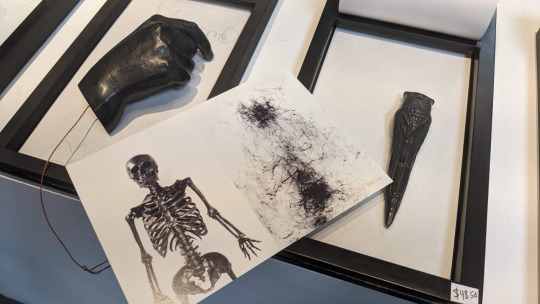
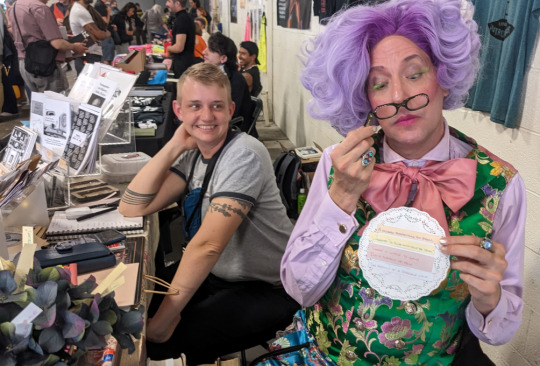
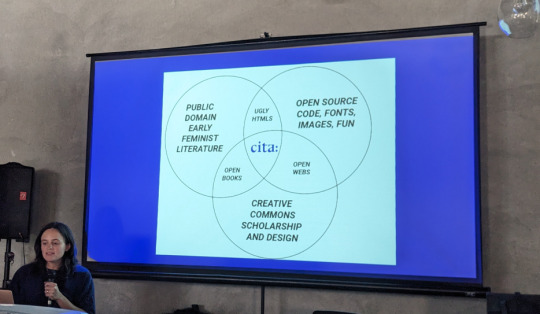
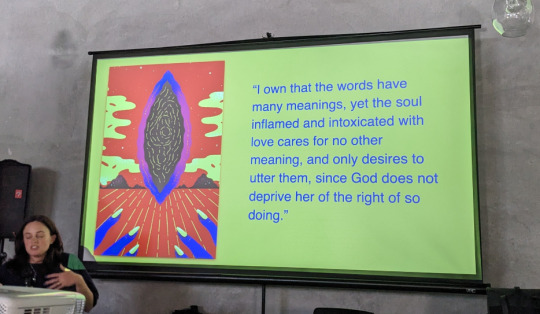
Was motivated to attend the SF Art Book Fair this year after seeing @njbice post that he'd be there and am oh so happy I went. Not exactly my "scene" but who isn't immune to a sea of beautiful works? Walked out with minimal purchases and remain haunted by The White Paper book I didn't get... not my subject but exquisite workmanship I could have gifted to someone else. (Did buy a lovely book about clouds from the same press however)
Caught a talk by Cita Press which I really enjoyed- they find and publish works written by women in the public domain (and are freely available on their website). Would have stopped by for more talks (it went all weekend) but was trapped in a class at the SFCB the two other days. Books books books abound!
#there was also an artist telling hands made out of graphite that you could draw with!! very soft- oh so fun to hold...#(( 🙈🙉 I don't want more things! I don't like buying things! but OH! such temptations! ))#book arts#san francisco#sf art book fair#works in the public domain
19 notes
·
View notes
Text
Hey quick question, when people talk about their OCs, does that include characters from original works too or is it only about making characters to go into fanworks/just making guys that you then put in various settings?
#i mean obviously if you’re writing og fic your characters are OCs#(unless you’re working with public domain stuff i guess)#but i want to know if the acronym is like#understood as meaning something more specific#in the general fandom and art communities#like should i say that i have hundreds of OCs because I’m writing a fantasy sf epic or none because those are Just Characters not OCs#(well i guess i have a couple OCs in my fics but those are just random guys with a few lines and a vague description#i made for practical reasons not My Guys)
3 notes
·
View notes
Text
Debut of one of SSW's most attractive SF models/actresses, Tiffany, of France. Appears as though she is a heavy, longtime smoker!
THE INTRODUCTION OF
TIFFANY ON SMOKING
SWEETIES (SPAIN)!
★ ★ ★ ★ ☆ | Four-and-a-Half "Stars"
From vs120shound staff | ★★★★★ (S/R)
Dual-Media 11-Pack Megapost!
HAD QUIT FOR 4 MONTHS
BUT IS BACK SMOKING!
Tiffany is a French stewardess in diplomatic relations as well as a fashion model. She had been a pack-a-day smoker for 12 years ⏤ starting her love affair with cigarettes as a teenager ⏤ before her four-month bid to quit smoking that ended this past autumn only a few days before Fran, the SSW web-master/web producer, shot her by capturing her beauty, seductive nature and stylish, strong smoking. Math indicates that she is in her late-20s or early-30s!
This video has been out in the public domain for approaching a month now on the Smoking Sweeties (Spain) website, with its mid-December 2023 release. Part of the narrative/description on www.smokingsweeties.com . . . "Her smoking style is intense, cheek-hollowing drags and cigarette flashing is combined with double-drags with nose jets [exhales], natural French inhales and erect drags."
Photos of Tiffany from the
Smoking Sweeties Website!









Here are some excerpts from comments on the webpage for the video, named Tiffany: Getting Back Into Her Habit:"
Bombshell Tiffany 4 weeks ago, by Anonymous
"WOW! Tiffany is gorgeous bombshell and an intense smoker. Beautiful great deep double-drags combined with fierce jets of nose exhales. I love ladies [who] smoke those strong 100 Reds. So please bring her back, a new stunning star is born. Great work (again), SSW!"
Gorgeous! Let's See More Of Her! 3 weeks ago, by Jon
"I just downloaded this video and watched it today. What a gorgeous woman! I hope we can see more of her, maybe in some outfits that show off her legs like short shorts or a skirt? She is an incredible smoker with great inhales and exhales and the discussion in this video was top notch. I hope she comes back. Bravo again for a superb new star!"
ANCHOR PHOTOGRAPH OF TIFFANY!

#SF#Hot women who love smoking cigarettes#Smoking cigarettes#Smoking#Tiffany of France for Smoking Sweeties!#“Tiffany: Getting Back Into Her Habit!”
181 notes
·
View notes
Text
Statues Set
After 3 days straight of fighting lighting issues I'm proud to say I'm finally ready with the statues! These are conversions of public domain models from sketchfab, edited by me (so they're not 1 million poly literally) with textures by me
Information:
14 objects, 7 meshes (each in a clean and aged version)
8 swatches per object
highest polycounts are around 7k, lowest at roughly 2k, varies from object to object depending on how nicely they wanted to decimate
all LODs
base game compatible
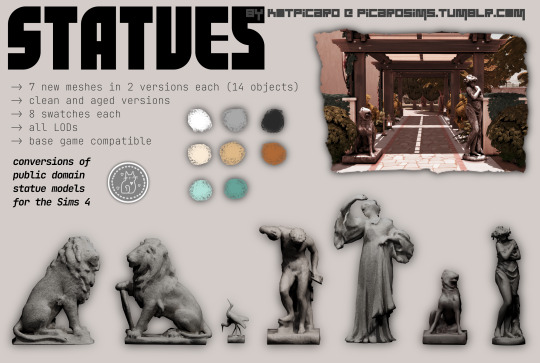
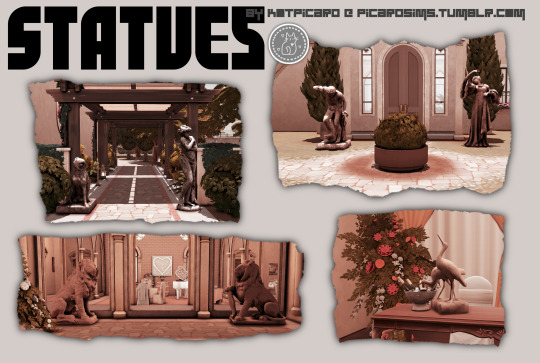



|| download || (SFS)
usual TOU (do whatever but no paywalls/early access/adfly)
tag me in screenshots and I'll love you forever
enjoy
kotpicard
links to the models in case someone was curious:
figure of a dancer
faun with cymbals
stork pair
lion
lion
jennings dog
surprised
#sims 4#ts4#simblr#sims 4 cc#ts4 cc#my cc#sims 4 maxis match#alwaysfreecc#build buy#sims 4 sculptures
199 notes
·
View notes
Text
Rêverie Macabre - A dark academia set of paintings

This is my come back on tumblr! I'm a bit late, but let's say it's a late Simblreen gift from me to you! 🍂🍁🌰
I got inspired to create this set while I was working on a lot that I will share with you very soon (maybe). I use lotusplum's Reverie Paintings very often but I wanted something a bit moodier for this lot, so I went on and creating this one.
Hope it gets you in the mood for the dark season 😎 Enjoy !
ABOUT THIS SET :
This set contains a bunch of paintings to decorate your walls, with a total of 20 swatches : 10 with a brown frame, 10 with a gold frame.
To find them ingame search [AnxiousArchitect], you should find it easily.
They're all recolors, mesh is from Maxis.
The paintings are actually classical artwork from painting masters of the last centuries ; I chose them all very carefully to create a diverse and pleasant set !
I used full paintings and painting pieces to create new ones. If you're interested in knowing the name of the artists, feel free to ask 🌱
It's fully base game compat....wait, i'm not so sure. You may or may not need Live Together for that one. Sorry, I'll check this out.
All of this paintings should be in public domain, which make it safe to share. But just in case, please let me know if you feel I'm not giving proper credit and I will correct it immediately.
PREVIEW :
-sorry these are poor quality images-not representative of how the set looks ingame-hey this is just a preview after all-


DOWNLOAD (SFS, no ads)
#ts4cc#ts4 halloween#the sims 4#sims 4 cc#simblreen 2023#dark academia#sims 4 paintings#sims 4 art#sims 4 historical#sims 4 custom content#ts4 decor#ts4 paintings#mycc
109 notes
·
View notes
Text

Dance of Death on BV Travelkeeper
Hans Holbein the Younger had a lot of ideas about how death approaches the rich, the poor, the powerful, and the not-so-much. Now your sims can too. Or at least 19 ways, as that's how many of his woodcuts are included in this set.
I was too lazy to take photos of all 19 in-game, so here are the swatches instead:

[L>R: Making Music, The Abbess, The Abbot, The Advocate, The Astrologer, The Bishop, The Emporer, The Judge, The King, The Knight, The Lady, The Miser, The Monk, The Nobleman, The Old Man, The Old Lady, The Physician, The Ploughman, The Senator]
Whether death skewers you with a lance, drags you off by your cassock, or plays you out on a bongo, no one escapes.
Download: SFS | Box
All files are compressed and labeled.
Credit to subversive Reformation-era artists, The Met, and Public Domain Review for the images
#my ts2 uploads#simblreen2023#simblreen 2023#sims 2#ts2#sims 2 download#dl: wall hanging#typo in the file name#but I don't feel like reuploading
55 notes
·
View notes
Text
Useful free tools for writing.
More of the incidental tools that I find useful, regardless of how one usually writes that are often known in the writing community, but you might not know?
One Look dictionary
Reverse word look up. You know when you're getting stumped on a word you kinda know, but only can get the definition of, or you want to make sure your 3-word phrase can't be said more succinctly? Yeah, this resource should help. (The underline is a link)
Google Docs
I should note that after about 100K words, it starts to struggle. But it's good for editing, collab work, spreadsheets, and also keeping track of your previous drafts so if someone says, "But, but you plagiarized from me," you have a log saying you didn't, so you can say, "you likely took from me."
And so on.
Libre Office–because not everyone wants to deal with Google Docs or can afford Microsoft office. It also has a recovery function, so if it crashes, you can get your words back. (Microsoft Office often doesn't?)
Use it for formatting your manuscripts. For the editors out there, accept ODT format. This is absolutely free and sometimes it doesn't port well.
Rhyming dictionaries–yes, they exist. The slant rhyming is also useful. There are slant rhyming dictionaries too.
The almighty square bracket. []
To all of you discovery writers out there that can't afford Scrivener. This is the tool for you. You've written and dumped all this information into the text that shouldn't belong there, but you want to keep it. What do you do? You square bracket it.
If not that, there is also the curly bracket if you need a sub category. {
It's great for:
Editing notes.
Please expand this note to yourself.
Examine this phrase later because you moved on, but it doesn't sound right.
Cataloging important information you might need at a later date.
Info dumping that you want to break up.
Storing long descriptions you want to use elsewhere.
You're too lazy to catalog in your world building notes great information.
You have ADHD and some other idea has occurred to you, but it's totally off topic. Square bracket.
To avoid plagiarism 'cause you forgot you pulled a source.
If you're one of those super detailed people, you can also color code it. The reason is that both curly and square brackets almost never show up in manuscripts. <> sometimes does, but also often doesn't.
The best part is no matter your program, format, or keyboard, you have it.
Note that this doesn't work for Japanese as well, but Japanese also have access to {} which is why I noted it here.
Spreadsheets
You need to make a calendar for your planet and need the quick calculations.
You need to make a morpheme list for your mythical language.
You want to delineate gender quickly.
This usually comes with Google Spreadsheets, Microsoft Office and Libre Office. But writers often (me included) forget they exist.
But they are useful for more than number crunching. And some writers use them for plotting too.
For Fantasy/SF writers: Donjon:
The whole website, but particularly the Fantasy Calendar maker is useful.
Google Search: Quotes.
You want to fact check a quote. Or you got distracted and forgot to put in the citation information.
To be or not to be
is horrible search for. So what you do is this:
"To be or not to be."
And you might get Will Shakespeare.
BTW, Goodreads is a horrible horrible source for finding out where quotes came from. Make sure you have the actual page number/place it was said with the surrounding quotes.
Equally, the -[item] is also often useful when you're searching.
You're looking up say... Kimchi, and you want search results that don't have napa in it You would type "kimchi -napa"
You are researching... I hope, I hope.
Public domain books: Project Gutenberg
You need a back issues of Gustav Freytag's Dies Techniks des dramas.
You need the quote from Anne of Green Gables.
You want to check if this Winnie the Pooh quote is in the earlier or later works because of public domain issues.
You need to read The Art of War for the tenth time.
You need to read Machiavelli's The Prince, because you are writing politics and war.
This is the place to find it. Sometimes, sometimes it is public domain, but it's not in there.
Library
Libby (app), for example. Sign up for it. Get a library card and you'll save yourself money. Some countries don't have one, but for the ones that do, you can read print books and consume audiobooks at home.
Often self-pubbed books are on there too. If you have an amazon account then you can use the kindle app with it.
Sometimes you can also go to university libraries and though you can't check anything out, you can use their catalogs to look up things. You sometimes have to be there, but often they give links to free resources in their catalogs and might be easier to use than JSTOR. You don't have to be a student. Just be respectful of the people there, and try to put the books back where you found them. (usual library stuff).
This will save you going to Hawaii for the University of Hawaii, for example, because you know they have some awesome East Asian resources.
17 notes
·
View notes
Text
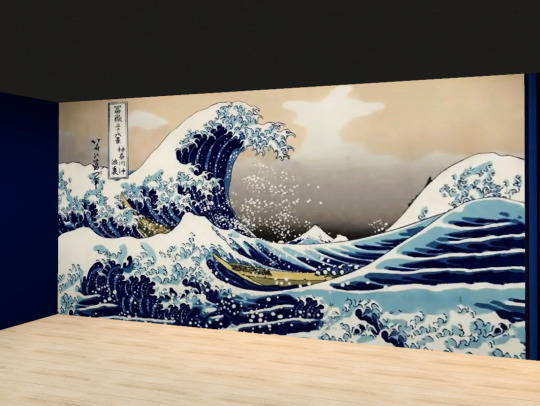
The Great Wave Off Kanagawa by Katsushika Hokusai - Wall Mural, 6 tiles
I wanted to do this mural for one specific house, but then, why not share it? Definitely not the first time a work of art was converted into CC...
6 tiles, NOT seamless, BGC, not recolorable, at Walls > Misc Walls, $15 per tile
Hokusai was a freaking GENIUS (although some of his prints aren't suitable for TS3 murals and paintings AT ALL LMAO) and this work is from the early 19th century, so, public domain :3
DOWNLOAD (package): SFS / Dropbox
144 notes
·
View notes
Text
This day in history

I'm on tour with my new, nationally bestselling novel The Bezzle! Catch me in TUCSON (Mar 9-10), then San Francisco (Mar 13), Anaheim, and more!

#20yrsago Lego Pantone values https://memex.craphound.com/2004/03/04/lego-pantone-values/
#20yrsago Mojo Nixon retiring https://web.archive.org/web/20040402054153/http://www.mojonixon.com/
#20yrsago Jay-Z construction set http://www.jayzconstructionset.com
#20yrsago Anthropomorphic Mars Rover LiveJournal https://opportunitygrrl.livejournal.com
#15yrsago Child in wet bathing suit made to stand in -5F weather because school policy forbade her from waiting in teacher’s car https://www.cbsnews.com/minnesota/news/teen-teachers-made-me-stand-outside-in-wet-bathing-suit-barefoot/
#10yrsago Data-compression with playing cards https://www.timwarriner.com/carddata/index.html
#10yrsago David Cameron’s porn-filter advisor arrested for possession of images of sexual abuse of children https://www.independent.co.uk/news/uk/crime/senior-tory-adviser-patrick-rock-arrested-on-child-pornography-allegations-9166837.html
#10yrsago Free download of danah boyd’s must-read book “It’s Complicated” https://www.zephoria.org/thoughts/archives/2014/03/03/its-complicated-open-access.html
#10yrsago Podcast: Cold Equations and Moral Hazard https://ia800202.us.archive.org/17/items/CoryDoctorowPodcast267ColdEquationsAndMoralHazard/Cory_Doctorow_Podcast_267_Cold_Equations_and_Moral_Hazard.mp3
#10yrsago Guy who “fixed” women’s computers spied through their webcams https://www.wired.co.uk/article/cyber-voyeur
#10yrsago Barrett Brown legal motion: linking is protected by the First Amendment https://web.archive.org/web/20140307111151/http://freebarrettbrown.org/right-to-link/
#5yrsago Fox News was always partisan, but now it is rudderless and “anti-democratic” https://www.newyorker.com/magazine/2019/03/11/the-making-of-the-fox-news-white-house
#5yrsago How the patent office’s lax standards gave Elizabeth Holmes the BS patents she needed to defraud investors and patients https://arstechnica.com/tech-policy/2019/03/theranos-how-a-broken-patent-system-sustained-its-decade-long-deception/
#5yrsago Open dataset of 1.78b links from the public web, 2016-2019 https://blog.gdeltproject.org/who-links-to-whom-the-30m-edge-gkg-outlink-domain-graph-april-2016-to-jan-2019/
#5yrsago Automated reception kiosks are a security dumpster fire https://securityintelligence.com/stranger-danger-x-force-red-finds-19-vulnerabilities-in-visitor-management-systems/
#5yrsago Alias: a smart-speaker “parasite” that blocks your speaker’s sensors until you activate it https://web.archive.org/web/20190321085518/https://bjoernkarmann.dk/project_alias
#5yrsago Financialization is wearing out its welcome https://www.ft.com/content/a9f13afc-3c3d-11e9-b856-5404d3811663
#5yrsago German data privacy commissioner says Article 13 inevitably leads to filters, which inevitably lead to internet “oligopoly” https://www.eff.org/deeplinks/2019/03/german-data-privacy-commissioner-says-article-13-inevitably-leads-filters-which
#5yrsago Tim Maughan’s Infinite Detail: a debut sf novel about counterculture, resistance, and the post-internet apocalypse https://memex.craphound.com/2019/03/04/tim-maughans-infinite-detail-a-debut-sf-novel-about-counterculture-resistance-and-the-post-internet-apocalypse/
#5yrsago Terra Nullius: Grifters, settler colonialism and “intellectual property” https://locusmag.com/2019/03/cory-doctorow-terra-nullius/
#5yrsago Leaked memo suggests that Google has not really canceled its censored, spying Chinese search tool https://theintercept.com/2019/03/04/google-ongoing-project-dragonfly/
#1yrago Solving the Moderator's Trilemma with Federation https://pluralistic.net/2023/03/04/pick-all-three/#agonism
2 notes
·
View notes
Note
Do you read much short fiction? What authors or anthologies do you recommend?
I love HP Lovecraft and Clark Ashton Smith- nothing beats old school weird fiction and it's all pretty much stuff you can read in a single sitting.
Smith is much more experimental but also way less consistent a writer than Lovecraft. I've read every one of his short stories but I can't honestly recommend you do the same unless you're really into him lol. Lots of them are downright bad but his best stuff is better than any of the other Weird Tales guys. I don't know if I can recommend a single anthology of his work, but some of my favorites of his stories are "The Vaults of Yoh-Vombis," "The City of the Singing Flame," "The Abominations of Yondo," and the "Isle of the Torturers." Those are among his more popular pieces, so it shouldn't be too hard to find a book that has one or two of them in it. If you don't mind reading stuff on a screen, all his work is in the public domain and is available for free here.
William Gibon's Burning Chrome is a phenomenal anthology, mostly of early cyberpunk. A lot more accessible than his later work and a bit less heavy- very fun read.
I just finished Octavia Butler's Bloodchild last week and I highly recommend it. Although most of the stories are deeply unsettling so if you want something more relaxing maybe skip it haha.
Thomas Ligotti's Songs of a Dead Dreamer and Grimscribe are some top-notch modern (well, modern relative to most of what I read) weird and horror fiction. Very somber, perfect reading going into October.
Not an anthology, but Cordwainer Smith's "Scanner's Live in Vain" may be the single most unique SF story I've ever read. I won't even try to summarize it, but you can check it out here. I definitely want to read more of his stuff, just haven't gotten around to it yet. His family was close friends with Sun Yet-sen and I've heard him described as the first man to write about catgirls. What a life.
I swear I read more than just genre fiction, but usually if I'm reading something "serious" it's a novel. A few pieces of "real literature" that I would recommend are:
-A Good Man is Hard to Find and Other Stories by Flannery O'Connor
-Olive Kitteridge by Elizabeth Strout
-"The Swimmer" by John Cheever
-"Cathedral" and "Why Don't You Dance?" by Raymond Carver
28 notes
·
View notes
Photo
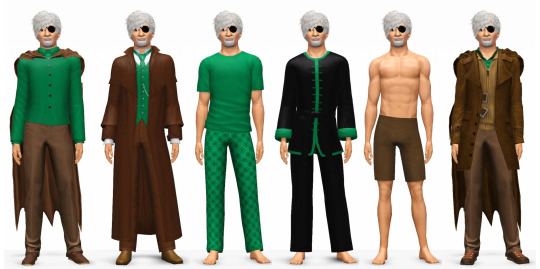

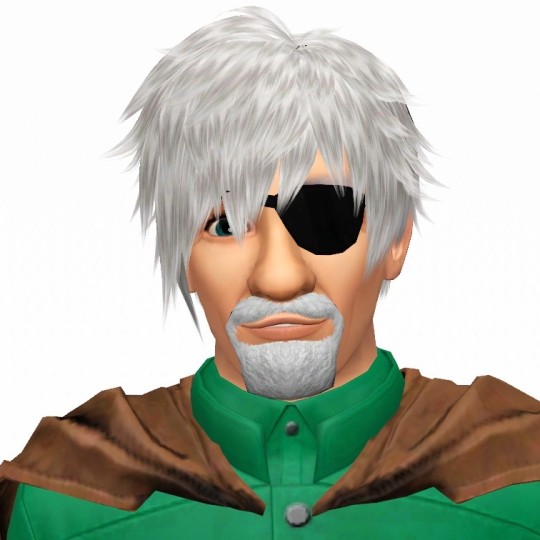
Marlon is the leader of the Adventurer’s Guild in the Mountains north of Pelican Town. He is a very accomplished gentleman who has mad skill with a sword. He is available for CC free download at SFS and TS3 Exchange.
CC used to get Marlon’s look
IfcaSims re-texture of KarumoSims/ChazyBazzy’s TianZili for Adults
Esmerelda’s TS2>3 Eyepatch
Necrodog’s Bushy Goatee
Shokoninio’s Cape (Mediafire Package File)
Marlon at Stardew Valley Wiki and Stardew Valley Expanded Fandom.
LTW: Great Explorer
Traits: Adventurer, Athletic, Brave, Disciplined, Shy
Skills: Athletic, Martial Arts
Favorites: Epic, Frogs Legs, Irish Green
Zodiac: Capricorn
Personal Inventory: Row Boat by Public Domains
Special thanks to @treason-and-plot who found the lovely cape for Marlon.
Stardew Valley Sims
47 notes
·
View notes
Text
How to Turn an Idea into a Story
Once you’ve generated an awesome story idea to pursue, the next thing to do is to flesh it out, so that you can actually write the story. If you’re like me, and you need to have a little bit of structure in place before you draft, then I have an idea I want to present to you. The foundation of this idea is the MICE Quotient, a storytelling framework with rules that help you tell cohesive narratives. By combining that with the idea of Elemental Genres (which was imparted to me by the amazing Writing Excuses Podcast), you get a framework that incorporates more story elements, specific to the genre(s) you’re using.
Steps
The general steps to use this framework are:
Create your story prompt using divergent and convergent thinking (I made a post about a potential process for this)
Think about the Elemental Genres of the story
Think about the MICE elements of the story (I made a post about a potential process for this)
Think about the elemental subgenres
Bring it all together
Step One: Getting the story prompt
Using the methods of idea generation and idea synthesis, figure out a basic idea of what your story is going to be. By the end, you end up with something resembling a logline or short paragraph synopsis (or something in between). For inspiration, you can look at stories in the public domain, the news, your own life, and other art, the options are endless.
Step Two: Choosing Elemental Genres
Elemental genres aren’t what we traditionally consider story genres. When I hear the word genre, I think of things like Science Fiction, Drama, Buddy Cop, etc. There’s some overlap name-wise between elemental genres and the traditional idea of genre, but they represent different things. Genres as we think of them usually are meant more to classify for the sake of the audience…it’s more of a categorization tool. Elemental genres are meant to bundle certain emotional responses to that story. A particular elemental genre is decided by the ideas that the story presents AND the emotions that stories in that elemental genre try to illicit. Also, note that elemental genres are used to tell stories in traditional genres. As an example, Science Fiction stories prescribe more to the themes, settings, and characters than an elemental genre would. A SF story could have any of the elemental genres, and any of the elemental genres can be used in the SF context.
The elemental genres are wonder, idea, adventure, horror, mystery, thriller, humor, relationship, drama, issue, and ensemble. You can probably come up with more using story analysis, but that’ll do for now.
Choosing your story’s foundational elemental genre requires you to look at your idea and think about what overall emotions you’re trying to get from the audience. If it’s a sense of awe, then your story’s main elemental genre is a wonder. If your story is about the limits of human physical ability, then it’s an adventure story. Each elemental genre elicits its own emotions.
To make sure that this is clear, I’ll use the example of elemental horror versus traditional horror. If you were to ask the point of a horror movie, it would be to cause fear. You might say that for one that has elemental horror, or is just broadly in the horror genre. The power of elemental horror allows you to understand what makes a horror movie tick, and apply that in new, other contexts. Horror in the traditional genre sense will usually fall into the monster, slasher, or psychological camps, and while there can be unique takes on these, they are all working from more surface levels of inspiration. Elemental horror can be a completely different kind of experience. An elemental horror story can be one where the protagonist(s) have to generally deal with horrible things, and we see their reaction to it and hope for the best while the story doesn’t really give us strong signals that things will end up okay. In this context, seemingly silly things can become horrifying given the right character context and reactions.
For more detail on specific genres, I have a document that I’ll link here with the elemental genres and describe how to use them.
Step Three: MICE Elements
Now, we start to get into actual story events. I have a longer explanation of the MICE quotient here, but the basic idea is that the MICE quotient is relating to four different elements of the story. M is for Milieu, which is the location where story events happen. I is for Inquiry, which is a driving question for the story that a character has. C is for Character and relates to some character flaw a character has and their journey to overcome it. E is for event and relates to something that happens in the world of the story that disrupts the status quo, and the character(s) journey to restore that status quo.
Think of mice elements like nesting dolls, holding your story in the middle. If you start the story with a MICE element, you have to end it with that same element. The second element gets resolved second to last. And it just continues, for as many of the elements as you decide to use.

In my post about the MICE Quotient, I go into more specifics on how to use it.
Step Four: Elemental Subgenres
Elemental subgenres are incorporating the parts or aspects of one elemental genre in the story that is primarily of another elemental genre. If our story is primarily an elemental adventure story, which is focused on the physical challenges driving the narrative, a subgenre implementation could be an elemental issue, where the adventure has a subplot of a greater political conflict that underscores the physical challenges. Subgenres can vary in amount and importance; they can be as short as a moment or span most of the story. Subgenres are used to enhance the narrative and build off of the themes and ideas of the MICE elements and primary elemental genres.
My Example
I’m going to bring all of these steps together by using this process for a story idea I have. The initial idea is: A god/deity falls in love with a human, and this union creates an equalization; the god loses some godliness, which is gained by the human. They both become equivalent in power to demigods.
Step One: Story Prompt
Through my story idea development process (explained in detail here), I came up with this story prompt: The worlds of gods and humans are ruled by centralized, hierarchical power structures that provide unsustainable decadence for the oligarchs at the expense of everyone else. One god and one human see each other as a haven to experience freedom from their current realities. The solidification of their relationship leads to them both becoming demigods, disrupting the status quo. To preserve themselves and their relationship, they have to contend against both worlds. Part of this involves sneaking into a council between the gods and humans and using the neutrality of the meeting to plead their cause.
Step Two: Primary Elemental Genre
Based on this description, I want the elemental genre to be drama. Drama is focused on the growth of the characters, and how that impacts the world. I pick this one because while the prompt lends itself well to the elemental romance genre, I want the story to be focused less on the trials and tribulations that the couple has with each other, and more on how their union causes hardship for them as partners, in opposition to the status quo.
Step Three: MICE
Now, with the idea and main elemental genre in tow, I can input the MICE elements to create the skeleton of my story.
<Xₓ> is opening/introducing an element
</Xₓ> is closing/resolving an element
<C₁> The god and the human protagonists long to be together corporally. The god can astral project to the human, but can’t easily come to our world. They want this because the closest thing they know to true happiness is each other.
<E₁> The two are able to meet in person due to a transgressive plan they craft together. This sets off a chain of events, transforming them both into demigods.
<I₁> The couple has to figure out how to survive and find a new life against both angry gods and jealous humans
</I₁> The couple meets a pocket of little-known dissenters to the hierarchical nature of the worlds they come from. Gods and humans from all backgrounds living in harmony show them that there is a possibility for a future centered around equality and solidarity.
</E₁> The couple are able to carve out a stable peace in the world, separate from the fighting both sides had to do in order to be together.
</C₁> The two finally achieve that real happiness they were looking for, not only from their love which has been forged in fire but the community that they’ve built along the way for this journey.
Notice how the elements are set up like nesting dolls; they have their own order that has to be followed.
Step Four: Subgenres
The secondary genre of the story that I want to explore is issue. Issue is all about a topic being discussed through the story. An issue element that will enhance the primary elemental genre is the exploration of the influence of hierarchy and power consolidation on the protagonists. We’ll see different points of view on the topic, and different philosophies will clash to challenge our protags and make them think critically about their worldview and the motivations behind it. Relationship, Humor, and Thriller would also be big subgenres.
All together:
<Drama>
<Issue>
<C₁> The god and the human protagonists long to be together corporally, as the god can astral project to the man, but can’t easily come to our world. They want this because the closest thing they know to true happiness is each other.
<E₁> The two are able to meet in person due to a transgressive plan they craft together. This sets off a chain of events, transforming them both after they hook up into demigods.
<Thriller>
<I₁> The couple has to figure out how to survive and find a new life against both angry gods and jealous humans
</I₁> The couple meets a pocket of little-known dissenters to the hierarchical nature of the worlds they come from. Gods and humans from all backgrounds living in harmony show them that there is a possibility for a future centered around equality.
<Humor>
<Humor>
</E₁> The couple is able to carve out a stable peace in the world, separate from the fighting both sides had to do in order to be together.
</Thriller>
</C₁> The two finally achieve that real happiness they were looking for, not only from their love which has been forged in fire but the community that they’ve built along the way for this journey.
</Issue>
</Drama>
One thing that I want to note is that while the MICE elements have to nest in a particular way, the same isn’t true for elemental subgenres. Elemental subgenres can show up as flashes in the story, appearing and disappearing within a single scene. They also don't necessarily have to close in a specific order like MICE elements
Conclusion
From here, I usually flesh out different characters, then I write a scene-by-scene outline. If you tend to explore more through drafting, you can start writing here, or plan out scenes in more detail—whatever works best for your process!
If you want more information on each elemental genre, I can’t recommend season 11 of Writing Excuses enough. This is one of the best things I’ve found in my creative writing journey. My own notes for the season are here. Anyway, I enjoyed coming up with this story idea. Now it’s time to get back to writing my current story!
#writerblr#writing#creative writing#writers of tumblr#writers of color#writerscommunity#writers and poets#writers#writing adventures#writblr#writeblr#writing community#writers on tumblr#writer problems#writing ideas#writing techniques#writing advice#storytelling#how to wr#fiction writing#how to write fiction#story ideas#short fiction#short stories#how to write
12 notes
·
View notes
Text
Weeks and months, but not quite years, go by and those running our network see no new videos of Australian beauty Laura! And now there's a flood -- 3 in this recent stretch. Here's the latest "discovery!"
LAURA OVERLOAD
MADNESS (AGAIN)!
WITH 'BFF' NATALIE,
SHOOTING SOME POOL
AND ENJOYING VSI20s!
★ ★ ★ ★ ☆ | Four-and-a-Half "Stars"
From allwhiteone20s | ★★☆ (S/R)
Tri-Media 11-Post, 53-Pack Megapost!
LAURA SHOWING JUST
HOW ELEGANT SHE IS!
Laura struck out a place in the Greater SF World Community scene with an assortment of traits and gifts that she packaged together in a remarkable and unique way that no other SF model/actress could duplicate or even approach! A rare and shining example of just how sexy, beautiful and appealing BHYSWs (Beautiful Hot, Young Smoking Women) can be in our little realm, particularly within our corner of space carved out among us who have gone down the tumblr SF-Content posting path. Laura is a special Smoking Angel for sure!
. . . well, Laura, was selected as the No. 1 choice for the "unofficial" official Top-25 all-time favorite SF models list published on vs120shound in January 2023. Years ago, we dubbed her "The Smoking Fetish Queen" and for good reason. Some of the photos of Laura that are contained in our Megapost from November 19 are repeats. Repeating these pictures is not ideal but our family of blogs/vlogs/webpages is guilty of far more egregious transgressions than that. (No one is in jail anywhere for forcing folks to see a picture for more than just one time.) We have a firm "NO REPEATS" policy in place within our domain but it applies to videos and clips only but not for photographs. Inconsistent! Hypocritical? Perhaps both. This is not the place or time to explain or defend our position. So long as we are consistent about it, our friends, fans and followers will know what to expect from us. Just hang out with us, gain some measure of pleasure from browsing our offerings and do so with few surprises insofar as what to anticipate next from our family. With tomorrow being Thanksgiving in the U.S.A., we will say that among much that qualifies, we express that we are thankful that we can share our Smoking Lovelies with those who are so inclined to keep us in mind for such enjoyment. And we are thankful in particular for Laura whom as an Australian does not celebrate this holiday. We shall never tire of adding more content of Laura to our network. Common sense dictates that it would be prudent to attempt to avoid any forms of "overload madness!" But not when it comes to Laura: The more of her, the better. Madness or otherwise; overload or otherwise. Overload Madness? That is something that is, quite candidly, aspirational for us! And we have no shame in admitting to that -- at all! Here is to hoping for an invigorating and joyful holiday celebration and starting on Black Friday a resumption of the recent spree -- ignited by the postings of others on tumblr -- of "Laura-ism"-type posts for all of us to enjoy and for us to re-blog in our own special, Megapost style!
Our Centerpiece video is from a post by allwhiteone20s on November 20, 2023 before vs120shound-2 started the re-posting process for our brand on November 21, 2023. The allwhiteone20s post had collected 189 positive comments (likes/re-blogs) as "LAURA OVERLOAD MADNESS (AGAIN)!" was leaving production and headed out for publication at 11:31 a.m. EST on 112223!
Re-blogged: November 22, 2023
Our Most Recent Post of Laura on Our Network!
From vs120shound on November 19, 2023 . . .
Assortment of scintillating photos
of "The Smoking Fetish Queen!"








#SF#Hot women who love smoking cigarettes#Smoking cigarettes#Smoking#allwhiteone20s!#Laura of Australia!#No. 1 on our “unoffical” official Top-25 favorite SF models list!
30 notes
·
View notes
Text
The Terror of Air-Level Six, By Harl Vincent.
Originally published in the July edition of Astounding Stories of Super-Science, which can be read and downloaded here for free on Project Gutenberg.
This story is public domain, meaning the plot, characters, and title belong to everyone and no one. Do whatever you want with it.
= = =
It was a sweltering evening in mid-August, during that unprecedented heat wave which broke Weather Bureau records in 2011. New York City had simmered under a blazing sun for more than three weeks, and all who were able had deserted the city for spots of lesser torridity. But I was one of those unfortunates who could not leave on account of the pressing urgency of business matters and, there being nothing else to do, kept doggedly at my work until it seemed that nerves and body must soon give way under the strain. To-night, as I boarded the pneumatic tube, I dropped into the nearest seat and could not even summon the energy to open my newspaper.
For some minutes I sat as in a daze, wishing merely that the journey was over, and that I was on my own front porch out in Rutherford. After awhile I stirred and looked around. Seeing none of my acquaintances in the car, I finally opened the newspaper and was considerably startled by the screaming headlines that confronted me from its usually conservative first page:[Pg 60]
Second Coast Transport
Plane Lost!
Disaster Like First in Air-Level Six!
No wonder the newsboys had been crying an extra on Broadway! I had given no heed to the import of their shoutings, but this was real news and well worthy of an extra edition. Since the mysterious loss of the SP-61, only four days previously, the facilities of the several air transportation systems were seriously handicapped on account of the shaken confidence of the general public. It was not surprising that there was widespread reluctance at trusting human lives and valuable merchandise to the mercies of the inexplicable power which had apparently wiped out of existence the SP-61, together with its twenty-eight passengers and the consignment of one-half million dollars in gold. And now the NY-18 had gone the way of the other!
-
Details were meager. Both ships had failed to reply to the regular ten-minute radio calls from headquarters and had not since been seen or heard from. In both cases the last call had been answered when the ship was proceeding at full speed on its regular course in air-level six. The SF-61 last reported from a position over Mora in New Mexico, and four days of intensive search by thousands of planes had failed to locate ship or passengers. To-day, in the early hours of the morning, the NY-18 reported over Colorado Springs, on the northern route, and then, like the SF-61, dropped out of existence insofar as any attempts at communicating with or locating her were concerned. She, too, carried a heavy consignment of specie, though only eleven passengers had risked the westward journey.
Someone had dropped into a seat at my side, and I looked up from my reading to meet the solemn eyes of Hartley Jones, a young friend whom I had not seen for several months.
"Why, hello, Hart," I greeted him. "Glad to see you, old man. Where in Sam Hill have you been keeping yourself?"
"Glad to see you, too, Jack," he returned warmly. "Been spending most of my time out at the hangar."
"Oh, that's right. You fellows built a new one at Newark Airport, didn't you?"
"Yeah. Got a great outfit there now, too. Why don't you drop around and see us one of these days?"
"I will, Hart, and I want you to take me up some time. You know I have never been in one of these new ships of yours. But what do you think of this mess?" I pointed to the black headlines.
He grinned joyously and flipped back the lapel of his coat, displaying a nickeled badge. "George and I are starting out to-night to look around a little," he gloated. "Just been appointed deputy air commissioners; and we got a couple of guns on our newest plane. Air Traffic Bureau thinks there's dirty work afoot. Twelve-motored planes don't disappear without leaving a trace. Anyhow, we've got a job, and we're going to try and find out what's wrong. How'd you like to come along?"
"What?" I replied. "You know darn well I'm too busy. Besides, I'd be no good to you. Just extra load, and not pay load at that. And then, I'm broke—as usual."
Hartley Jones grinned in his engaging way. "You'd be good company," he parried; "and, what's more, I think the trip would do you a lot of good. You look all shot to pieces."
"Forget it," I laughed. "It's just the heat. And I'll have to leave you here, Hart. Drop in and see us, will you? The wife was asking for you only yesterday."
"Jack, dear," my wife greeted me at the door of my modest suburban home, "Mr. Preston just called, and he wants you to call him right back."[Pg 61]
"Oh, Lord," I groaned, "can't I forget the office for one evening?" Preston was manager of the concern for which I worked.
Nevertheless, though our two fine youngsters were clamoring for their dinner, I made the telephone call at once.
"Makely," came the voice of the boss, when the connection was completed, "I want you to take the night plane for Frisco. Hate to ask you, but it must be done. Townley is sick and someone has to take those Canadian Ex. bonds out to Farnsworth. You're the only one to do it, and after you get there, you can start on that vacation you need. Take a month if you wish."
The thought of Hartley Jones' offer flashed through my mind. "But have you read of the loss of the NY-18?" I asked Preston.
"I have, Makely. There'll be another hundred a month in your check, too, to make up for the worry of your family. But the government is sending thirty Secret Service men along on the SF-22, which leaves to-night. In addition, there will be a convoy of seven fighting planes, so there is not likely to be a repetition of the previous disasters."
That hundred a month sounded mighty good, for expenses had been mounting rapidly of late. "All right, Mr. Preston," I agreed. "I will be at the airport before midnight. But how about the bonds?"
"I'll drive around after dinner and deliver them to you. And thanks for your willingness, Makely. You'll not be sorry."
My wife had listened intently and, from my words, she knew what to expect. Her face was a tragic mask when I replaced the receiver on its hook, and my heart sank at her expression.
Then there came the ring of the telephone and, for some reason, my pulse raced as I went to the hall to answer it. Hartley Jones' cheerful voice greeted me and he was positively gleeful when I told him of my projected trip.
"Hooray!" he shouted. "But you'll not take the SF-22. You'll take the trip with me as I wanted. I tell you what: You be out at Newark Airport at eleven-thirty, but come to my hangar instead of to that of the transportation company. We'll leave at the same time as the regular liner, and we'll get your old bonds to Frisco, regardless of what might happen to the big ship. Also we might learn something mighty interesting."
I argued with him, but to no avail. And the more I argued, the greater appeal was presented by his proposition. Finally there was nothing to do but agree.
Preston arrived with the bonds shortly after the children were tucked in their beds. I did not tell him of my change in plans. He did not stay long, and I could see that he was uncomfortable under the accusing eyes of Marie, for all his own confidence in the safety of the trip in the closely-guarded SF-22.
At precisely eleven-thirty I reached the great steel and glass hangar where Hart Jones and George Boehm carried on their experiments with super-modern types of aircraft. Hart Jones had inherited more than two million dollars, and was in a fair way to spend it all on his favorite hobby, though those who knew him best vowed that he would make many times that amount through royalties on his ever-growing number of valuable inventions.
The immense doors were open, and I gazed for the first time into the hangar whose spacious interior provided storage and manufacturing facilities for a dozen or more planes of Hart Jones' design. A curiously constructed example of his handiwork stood directly before me, and several mechanics were engaged in making it ready for flight. My friend advanced from their midst to meet me, a broad smile on his grease smeared countenance.[Pg 62]
"Greetings, Jack," he said, taking my small bag from my hands. "Right on time, I see. And I can't tell you how glad I am that you are coming with us. So is George."
"Well, I didn't expect to," I admitted; "but there is no need of telling you that I had far rather be in your ship than in the big one."
George Boehm, the same jolly chap I had several times met in Hart's company, but fatter than ever, crawled from beneath the shiny metal body of the plane and scrambled to his feet at my side.
"Going in for a bit of adventuring, Mr. Makely?" he asked, wiping his hand with a piece of cotton waste before extending it.
"Yes," I replied, as I squeezed his chubby fingers. "Can't stick in the mud all my life, George. And I wouldn't want to be in better company for my first attempt either."
"Nor we," he returned, a mischievous twinkle in his eyes. "Rather have a greenhorn on the Pioneer than some government agent, who'd be butting in and trying to run everything. Think you'll be scared?"
"Probably," I admitted; "but I guess I can stand it."
"Hear the latest news broadcast?" interrupted Hart Jones.
"No. What was it?" I asked.
"There has been a report from out near Cripple Creek," said Hart solemnly, "that a pillar of fire was observed in the mountains shortly after the time the NY-18 last reported. The time and the location coincide with her probable position and the report was confirmed by no less than three of the natives of that locality. Of course the statements are probably extravagant, but they claim this pillar of fire extended for miles into the heavens and was accompanied by a tremendous roaring sound that ceased abruptly as the light of the flame disappeared, leaving nothing but blackness and awe-inspiring silence behind."
"Lot of bunk!" grunted George, who was vigorously scrubbing the back of his neck.
"Sounds like a fairy tale," I commented.
"Nevertheless, there may be something in it. In fact, there must be. Three of these mountaineers observed practically the same phenomenon from quite widely separated points, though one of them said there were three pillars of fire and that these looked more like the beams of powerful search-lights. All agreed on the terrific roar. And, after all, these two liners did disappear. There must be something quite out of the ordinary about the way in which they were captured or destroyed, and this occurrence may well be supposed to have a bearing on the matter."
"Possibly they were destroyed by some freak electrical storm," I suggested.
"Where then are the wrecked vessels?" asked Hart. "No, Jack, electrical storms do not destroy huge air liners and then suck them out into space beyond our vision. These two ships are no longer on the surface of the earth, else they would have been long since located. The magnetic direction finders of the transportation people have covered every inch of the United States, as well as Mexico and Canada."
"Of course they might have been carried halfway around the world by a wind of unprecedented velocity." I commenced a silly argument in favor of the theory that the elements had accounted for the two vessels, but was interrupted by the mounting roar of great engines throbbing overhead.
"Hurry up there, George!" shouted Hart. "It's the SF-22 coming in. We have to be ready for the take-off in five minutes!"
He hastened to take George's place at the washbowl and all was activity within the confines of our hangar. George and I left the office and went out to the landing field, which[Pg 63] was now brilliant with the glare of floodlights. The Pioneer had been trundled into the open and stood ready for the flight. Not a hundred feet above the field, the huge silver moth that was the SF-22 swept by in a wide circle that would bring her into the wind. The roar of her engines died as she swung out of the circle of light into the surrounding darkness.
The crowds which had gathered to witness her landing buzzed with excited comment and speculation. Her nose brought slightly up, she dropped to a perfect three-point landing, the brakes screeching as she was brought to a standstill at the hangar of the transportation company.
"Come on now, you fellows," came the voice of Hart Jones from the hangar entrance, "there's no time to lose. The Pioneer takes off immediately after the big fellow."
We hurried to the waiting ship, which seemed like a tiny toy when compared with the giant SF-22. I had observed very little of the construction of the Pioneer, but I could now see that she was quite different in design from the ordinary plane. A monoplane she was, but the wing structure was abnormally short and of great thickness, and there were a number of tubes projecting from the leading edge that gave the appearance of a battery of small cannon. The body, like all planes designed for travel in air-level six, was cigar-shaped, and had hermetically sealed ports and entrance manholes. A cluster of the cannon-shaped tubes enclosed the tail just back of the fins and rudder and, behind the wing structure atop the curved upper surface of the body, there was a sphere of gleaming metal that was probably three feet in diameter.
Before I could formulate questions regarding the unusual features of the design, we were within the Pioneer's cabin and Hart Jones was engaged in clamping the entrance manhole cover to its rubber seat. A throbbing roar that penetrated our double hull attracted my attention and, looking through a nearby porthole, I saw that the convoy of army planes had taken off and was circling over the SF-22 in anticipation of her start. Trim, speedy fighting ships these were, with heavy caliber machine-guns in turrets fore and aft and normally manned by crews of twelve each. The under surfaces of their bodies glistened smooth and sleek in the light from the field, for the landing gears had been drawn within and the openings sealed by the close-fitted armor plate that protected these ordinarily vulnerable portions when in flight.
The SF-22 was ready to take off and the crowds were drawing back into the obscurity beyond the huge circle of blinding light. One after another her twelve engines sputtered into life, and ponderously she moved over the field, gathering speed as the staccato barking of the exhausts gradually blended into a smooth though deafening purr. The tail of the great vessel came up, then the wheels, and she was off into the night.
Hart Jones sat at a bewildering array of instruments that covered almost the entire forward partition of the cabin. He pressed a button and the starting motor whined for a moment. Then the single engine of the Pioneer coughed and roared. Slowly we taxied in the direction taken by the SF-22, whose lights were now vanishing in the darkness. I saw George open a valve on the wall and Hart stretched the fingers of his left hand to what appeared to be the keyboard of a typewriter set into the instrument board. He pressed several of the keys and pulled back his stick. There was a whistling scream from astern and I was thrown back in my seat with painful force. With that, the motor roared into full speed and we had left the airport far behind.
"What on earth?" I gasped.
"Rocket propulsion," laughed Hart.[Pg 64] "I should have warned you. Those tubes you saw outside at the tail and along the leading edge of the wings. Only used three of them, but that was sufficient for the take-off."
"But I thought this rocket business was not feasible on account of the wastage of fuel due to its low efficiency," I objected.
"We should worry about fuel," said Hart.
I looked about me and saw that there was very little space for the storage of this essential commodity. "Why?" I inquired. "What fuel do you use?"
"Make our own," he replied shortly. He was busy at the moment, maneuvering the Pioneer into a position above and behind the SF-22 and her convoy.
"You make your own fuel enroute?" I asked in astonishment.
"Yes. That sphere you saw on top. It is the collecting end of an electrical system for extracting nitrogen and other elements, from the air. This extraction goes on constantly while we are in the atmosphere and my fuel is an extremely powerful explosive of which nitrates are the base. The supply is replenished continuously, so we have no fear of running short even in the upper levels."
George had crawled through a small opening into some inaccessible region in the stern of the vessel. I pondered over what Hart had just told me, still keeping my eyes glued to the port, through which could be seen the fleet we were following. The altimeter registered thirty-five thousand feet. We were entering air-level six—the stratosphere! Below us the troposphere, divided into five levels, each of seven thousand feet, teemed with the life of the air. The regular lanes were filled with traffic, the lights of the speeding thousands of freight and pleasure craft moving in orderly procession along their prescribed routes.
Up here in the sixth level, which was entirely for high-speed traffic of commercial and government vessels making transcontinental or transoceanic voyages, we were the only adventurers in sight—we and the convoyed liner we were following. The speed indicator showed six hundred miles an hour, and the tiny spot of light that traveled over the chart to indicate our position showed that we were nearing Buffalo.
Glancing through one of the lower ports, I saw the lights of the city shining dimly through a light mist that fringed the shore of Lake Erie and extended northward along the Niagara. Then we were out over the lake, and the luminous hue was slipping rapidly behind. I looked ahead and saw that the distance to the SF-22 and her convoy had somewhat increased. We were a mile behind and some two thousand feet above them. Evidently Hart was figuring on keeping at a safe distance for observation of anything that might happen.
Our motor was running smoothly and the angle of the propeller blades had been altered to take care of the change in air density from the lower altitudes. It flashed across my mind that this was an ideal location for an attack, if such was to be made on the SF-22.
Then, far ahead, I saw a beam of light stab through the darkness and strike the tossing surface of the lake. Another and another followed, and I could see that the SF-22 and her convoy were surrounded by these unearthly rays. They converged from high above to outline a brilliant circle where they met on the surface of the waters, and in the midst of the cone formed by the beams, the liner and its seven tiny followers could be seen to falter, and huddle more closely together.
It all happened in the twinkling of an eye—so quickly, in fact, that Hart and I had not the time to exchange remarks over the strange occurrence. For a moment the eight vessels hovered, halted suddenly by this inexplicable force from out the heavens. Then[Pg 65] there rose from the apex of the inverted cone of light a blinding column of blue-white radiance that poured skyward an instant and was gone. To our ears came a terrific roaring that could be likened to nothing we had heard on earth. The Pioneer was tossed and buffeted as by a cyclone, and George came tumbling from the opening he had entered, his round face grown solemn. Then came eery silence, for the Pioneer's motor had gone dead. Ahead there was utter darkness. The liner and her convoy had completely vanished and the Pioneer was slipping into a spin!
"What's up?" asked George of Hart, who was tugging frantically at the controls.
"The liner has gone the way of the first two," he replied: "and the yarn about the pillar of fire was not so far wrong after all."
"You saw the same thing?" asked George incredulously.
"Yes, and so did Jack. There came some beams of light from the sky; then the pillar of fire and the roaring you heard, after which the vessels were gone and our electrical system paralyzed."
"Holy smoke!" ejaculated George. "What to do now?"
As he spoke, the Pioneer came out of the spin, and we were able to resume our positions in the seats. None of us was strapped in, and we had been clinging to whatever was handiest to keep from being tossed about in the cabin. Hart wiped his forehead and growled out an oath. The instrument board was still illuminated, for its tiny lamps were supplied with current from the storage battery. But the main lights of the cabin and the ignition system refused to function. We were gliding now, but losing altitude rapidly, having already dropped to the lower limits of level five.
"Can't you use the rocket tubes?" I inquired hesitatingly.
"They are fired in the same manner as the motor," replied Hart; "but we might try an emergency connection from the storage battery, which is ordinarily used only in starting and for the panel lights."
George was already fussing with the connections in a small junction box from which he had removed the cover. Meanwhile, the black waters of Lake Erie were rushing upward to meet us, and the needle of the altimeter registered twelve thousand feet.
"Here's the trouble!" shouted George, triumphantly holding up a small object he had removed from the junction box. "Ignition fuse is blown."
"Probably by some radiations from the cone of light and the column that destroyed the liner. Lucky we were no closer," were Hart's muttered comments.
George produced a spare fuse and inserted it in its proper place. The cabin lights glowed instantly and the motor started at once.
"Well, I'm going up after the generators of this mysterious force that is destroying our cross-country ships and killing our people," asserted Hart. "The rays came from high above, but the Pioneer can go as high as anything that ever flew—higher."
He snapped a switch and a beam of light that rivalled the so-called pillar of fire bored far into the night, dimming the stars by its brilliance. Again his fingers strayed to the rows of white keys and the rocket tubes shrieked in response to his pressure. This time I was prepared for the shock of acceleration, but the action was maintained for several seconds and I found the pressure against my back growing painful. Then it was relieved, and I glanced at the altimeter. Its needle had reached the end of the scale, which was graduated to eighty thousand feet!
"Good Lord!" I exclaimed. "Do you mean to tell me that we are more than sixteen miles in the air?"
"Nearly thirty," replied Hart, pointing to another dial which I had not[Pg 66] seen. This one was graduated in miles above sea-level, and its needle wavered between the twenty-nine and thirty mark!
Again Hart pressed the rocket buttons, and we shot still higher into the heavens. Thirty, forty, fifty miles registered the meter, and still we climbed.
"Great Scott!" blurted a voice I knew was my own, though I had no consciousness of willing the speech. "At this rate we'll reach the moon!"
"We could, if we wished," was Hart's astounding reply; "I wish you wouldn't say too much about it when we return. We have oxygen to breathe and an air-tight vessel to retain it. With the fuel we are using, we could easily do it, provided a sufficient supply were available. However, the Pioneer does not have large enough storage tanks as yet, and, of course, we cannot now replenish our supply with sufficient rapidity, for the atmosphere has become very rare indeed—where we are. My ultimate object, though, in building the Pioneer, was to construct a vessel that is capable of a trip to the moon."
"You think you could reach a great enough velocity to escape the gravitational pull of the earth?" I asked, marveling more and more at the temerity and resourcefulness of my science-minded friend.
"Absolutely," he replied. "The speed required is less than seven miles a second, and I have calculated that the Pioneer can do no less than twenty."
Mentally I multiplied by sixty. I could hardly credit the result. Twelve hundred miles a minute!
"But, how about the acceleration?" I ventured. "Could the human body stand up under the strain?"
"That is the one problem remaining," he replied; "and I am now working on a method of neutralizing it. From the latest results of our experiments, George and I are certain of its feasibility."
The Pioneer was now losing altitude once more, and Hart played the beam of the searchlight in all directions as we descended. He and George watched through one of the floor ports and I followed suit. We were falling, unhampered by air resistance, and our bodies were practically weightless with reference to the Pioneer. It was a strange sensation: there was the feeling of exhilaration one experiences when inhaling the first whiff of nitrous oxide in the dentist's chair—a feeling of absolute detachment and care-free confidence in the ultimate result of our precipitous descent.
I found considerable amusement in pushing myself from side to side of the cabin with a mere touch of a finger. There was no up nor down, and sometimes it seemed to me that we were drifting sideways, sometimes that we fell upward rather than downward. Hart and George were unconcerned. Evidently they were quite accustomed to the sensations. They bent their every energy toward discovering what had caused the disaster to the SF-22 and its convoy.
For several hours we cruised about on the strangest search ever made in the air. Alternately shooting skyward to unconscionable altitudes and dropping to levels five and six to replenish our fuel supply, we covered the greater portion of the United States before the night was over. But the powerful searchlight of the Pioneer failed to disclose anything that might be remotely connected with the disappearance of the SF-22.
For me it was a never-to-be-forgotten experience. Lightning dashes from coast to coast which required but a few minutes of time—circling many miles above New York or Washington or Savannah in broad daylight with the sun low on the up-curved horizon; then shooting westward into the darkness and skirting the Pacific coast less than fifteen minutes later, but with four hours' actual time difference. Space and time were almost one.[Pg 67]
Hart had not provided the Pioneer with a radio or television transmitter, but there was an excellent receiver, and, through its agency we learned that the world was in a veritable uproar over the latest visitation of the mysterious terror of the sixth air level. All commercial traffic in levels four, five and six was ordered discontinued, and the government air control stations were flashing long messages in code, the import of which could but be guessed. Vision flashes showed immense gatherings at the large airports and in the public squares of the great cities, where the general populace become more and more excited and terrified by the awful possibilities pictured by various prominent speakers.
The governments of all foreign powers made haste to disclaim responsibility for the air attacks or for any attempt at making war on the United States. News broadcasts failed to mention Hart Jones or the Pioneer, since the mission had been kept secret. The phenomenon of the rays and the roaring column of light had been observed from many points on this occasion and there was no longer any doubt as to the nature of the terror as visible to the eye, though theories as to the action and source of the rays conflicted greatly and formed the basis of much heated discussion.
Eventually the advancing dawn reached San Francisco, and with its advent Hart decided to make a landing in that city so that my bonds could be delivered.
Jones was apparently a very much mystified and discouraged man. "Jack," he said, "it seems to me that this thing is but the beginning of some tremendous campaign that is being waged against our country by a clever and powerful enemy. And I feel that our work in connection with the unraveling of the mystery and overcoming the enemy or enemies is but begun. It's a cinch that the thing is organized by human minds and is not any sort of a freak of the elements. Our work is cut out for us, all right, and I wish you would stick to George and me through the mess. Will you?"
"Sure," I agreed, readily enough. "After these bonds are delivered I am free for a month."
"Ha! Ha!" cackled George, without mirth. "A month! We're doggoned lucky if we get to the bottom of this in a year."
"Nonsense!" snapped Hart, who was considerably upset by the failure to locate the source of the disastrous rays. "There is nothing supernatural about this, and anything that can be explained on a scientific basis can be run to earth in short order. These rays are man-made and, as such, can be accounted for by man. Our greatest scientists must be put to work on the problem at once—in fact, they have quite probably been called in by the government already."
He was maneuvering the Pioneer to a landing on the broad field of the San Francisco airport. Hundreds of idle planes of all sizes lined the field, and, unmindful of the earliness the hour, a great crowd was collected in expectation of sensational reports from the occupants of arriving ships. The unusual construction of the Pioneer attracted considerable attention and it was with difficulty that the police kept back the crowd when she rolled to a stop near the office of the local government supervisor. We hustled inside and were greeted by that official with open arms.
"Glory be!" he exclaimed. "Hart Jones and the Pioneer. Every airport in the land has been on the lookout for you all night. It was feared you had been lost with the SF-22 and the others. Code messages to the supervisors of all districts advised of your mission, though it has been kept out of the general news, as has the message from the enemy."
"Message from the enemy!" gasped[Pg 68] Hart, George and I, echoing the words like parrots.
"Yes. A demand that the United States surrender, and a threat to descend into the lower levels if the demand is not complied with in twenty-four hours!"
"Who is this enemy?" asked Hart, "and where?"
"Who they are is not known," replied the official gravely; "and as to the location, the War Department is puzzled. Direction finders throughout the country took readings on the position of their radio transmitter and these readings differed widely in result. But the consensus of opinion is that the messages originate somewhere out in space, probably between fifty and one hundred thousand miles from our earth."
"Great guns!" Hart glanced at George and me, where we stood with stupidly hanging jaws. "And what does the government want of me now?"
"You are considered to be the one man who might be able to cope with the problem, and are ordered to report to the Secretary of War, in person, immediately."
Hart was electrified into instant activity. "Here," he said in a voice of authority that commanded the official's attention and respect, "see that this package of bonds is delivered at once to the addressee and that the addressor is advised of its safe arrival. We're off at once."
Suiting action to the words, he thrust my packet into the hands of the astonished supervisor. Then, turning sharply on his heel, he flung back, "Advise the Secretary of War that I shall report to him in person in less than one hour."
As we stepped through the entrance of the Pioneer, he shot a final look at the official and laughed heartily at his sudden accession of energy. We had not the slightest doubt that Hart's orders would be immediately and efficiently carried out.
In precisely forty-five minutes, we stood before the desk of Lawrence Simler, then Secretary of War, in Washington.
"You are Mr. Hartley Jones?" inquired the stern-visaged little man.
"I am, Mr. Secretary, and these are my friends and co-workers, George Boehm and John Makely."
The Secretary acknowledged the introduction gravely, then plunged into the heart of the matter at hand with the quick energy for which he was famed.
"It may or may not be a serious situation," he said, "but certainly it has thus far been quite alarming. In any event, we have taken the matter out of the hands of the Air Traffic Bureau. We are prepared to defy the ultimatum of the enemy, whoever he may be. But we want your help, Mr. Jones. Every ship of the Air Navy will be in the upper levels within the prescribed twenty-four hours, and we will endeavor to stave off their attacks until such time as you can fit the Pioneer for a journey to their headquarters."
"How can your antiquated war vessels, capable of hurling a high explosive shell no more than fifty miles, fight off an enemy that is thousands of miles distant?" asked Hart.
"It is believed by the research engineers of the government that, though their headquarters may be located at a great distance, the raiders drop to a comparatively low altitude at the time of one of their attacks, returning immediately thereafter to their base."
Hart Jones shook his head. "The engineers may be correct," he stated; "but how on earth can you expect a little vessel like the Pioneer to battle an enemy who is possessed of these terribly destructive weapons and who has sufficient confidence in his own invulnerability to declare war on the greatest country on earth?"
Secretary Simler dropped his voice to a confidential tone, and his keen gray eyes flashed excitement as he unfolded the details of the[Pg 69] discoveries and plans of the War Department. We three listened in undisguised amazement to a tale of the unceasing labors of our Secret Service agents in foreign countries, of elaborate experiments with deadly weapons and the chemicals of warfare.
We heard of marvelous new rays that could be projected for many miles and destroy whole armies at a single blast; rays that would, in less time than that required to tell of the feat, reduce to a mass of fused metal the greatest firstline battleships of the old days of ocean warfare. We heard of preparations for defensive warfare throughout the civilized world, preparedness that insured so terrible and final a war that it was literally impossible for a great world conflagration to again break out. We learned that the present mysterious signs of a coming war could not possibly have originated in any country on earth, else they would have been known of long in advance, due to the network of the Secret Service system. This war, so unexpectedly thrust upon us, was undoubtedly a war of planets!
"But," objected Hart, "the messages were in English, were they not?"
"They were," continued Secretary Simler, "and that puzzled our experts in the beginning. But, it may well be that our enemy from out the skies has had spies among us for many years and could thus have learned our languages and radio codes. In any event, we are to meet destructive rays with others equally destructive, and you, Hartley Jones, are the man who can make our effectiveness certain."
"I?"
"Yes. How long a time will be required in fitting out the Pioneer for reliable space flying?"
Hart Jones pondered the matter and I could see that he was overjoyed at the prospect of getting into the thing in earnest. "About one week," he replied, "providing you can send a force of fifty expert mechanics to my hangar at once and supply all material as fast as I shall require it."
"Excellent," said the Secretary. "We'll have the men there in a few hours and will obtain whatever you need, regardless of cost, for immediate delivery. Incidentally, there will be several scientists as well, who will supervise the installation of two types of ray generators and their projecting mechanisms on the Pioneer. You will need them later."
"I don't doubt we shall," said Hart. "And now, with your permission, we shall leave for the hangar. I'm ready to start work."
"Capital!" Secretary Simler pressed every one of a row of buttons set in his desk top. We were dismissed.
"Well," said I, when we reached the outside, "he has given you quite a job, Hart!"
"You said something," he replied. "But, if this threat from the skies proves as real and as calamitous as I think it will, we all have our work cut out for us."
"Do you really believe this enemy comes from another planet?" asked George as we entered the Pioneer for the trip home.
"Where else can they be from?" countered Hart. "But, really it makes no difference to us now. We have to go after them in earnest. Don't want to quit, do you, George?"
"Wha-a-at?" shouted George, as he jerked savagely at the main switch of the Pioneer. "You know me better than that, Hart. Did I ever let you down in anything?"
"No," admitted the smiling Hart, "you never did, bless your heart. But Jack here is another matter. He has a wife and two kids to look after. That lets him out automatically."
My heart sank at the words, for I knew that he meant what he said. And, truth to tell, I saw the justice in his remarks.
"But, Hart," I faltered, "I'd like to be in on this thing."
"I know you would, old man. But I[Pg 70] think it's out of the question, for the present at least. You can help with the reconstruction of the Pioneer, however."
And meekly I accepted his dictum, though with secretly conflicting emotions. Little did I realize at the time that Hart knew far more than he pretended and that he had merely attempted to salve his own conscience in this manner.
I was very anxious to return to my family, and, as I sped homeward in a taxicab after the Pioneer landed at her own hangar, my mind was filled with doubts and fears. Secretary Simler had been very brief in his talk, but his every word carried home the gravity of the situation. What if these invaders carried the war to the surface? Suppose they seared the countryside and the cities and suburbs with rays of horrible nature that would shrivel and blast all that lay in their path? My heart chilled at the thought and it was a distinct relief when I gazed on my little home and saw that it was safe—so far. I paid the driver with a much too large bank note and dashed up my own front steps two at a time.
A few hours later I tore myself away and returned to the hangar, where the Pioneer now reposed in a scaffolded cradle. The sight which met my eyes was astonishing in the extreme, for the hangar had been transformed into a huge workshop with seemingly hundreds of men already at work. It was a scene of furious activity, and, to my utter amazement, I observed that the Pioneer was already in an advanced stage of disassembly.
I had no difficulty in locating Hart Jones, for he was striding from lathe to workbench to boring mill, issuing his orders with the sureness and decision of a born leader of men. He welcomed me in his most brisk manner and immediately assigned me to a portion of the work in the chemical laboratory—something I was at least partly fitted for.
We labored far into the night, when a siren called us to rest and food. This was to be a night and day job, and not a man of those on duty gave thought to the intense nervous and physical strain. Sixty-five of us I learned there were, though it had seemed there were several times that number.
During the rest period, Hart switched on the large television and sound mechanism of the public news broadcasts. Great excitement prevailed throughout the United States, for there had been a leak and the news had gone abroad regarding the message from the enemy. There was widespread panic and disorder and the government was besieged with demands for authentic news. The twenty-four hours of grace had nearly expired.
Finally the public was told of what actually was happening. Our entire fleet of one thousand air cruisers was in air-level six, waiting for the enemy. America was going to fight in earnest!
Flashes of our air cruisers in construction and in action came over the screen; voice-vision records of the popular officers of the fleet followed in quick succession. Then came the blow—the first of the strange war.
Two vessels of the air fleet had been destroyed by the triple rays and pillar of fire! Fifty cruisers rushing to the scene had been unable to find any traces of the source of the deadly rays. And, this time, there was an alarming added element. The pillar of fire had risen from a point near Gadsden in Alabama and, in its wake, there spread a sulphurous, smoldering fire that crept along the ground and destroyed all in its path. Farms, factories, and even the steel rails of the railroads were consumed and burned into the ground as if by the breath of some tremendous blast furnace. Hundreds of inhabitants of the section perished, and it was reported that the fumes from the strange fires were drifting in the direction of Birmingham, terrifyingly visible in blue-green clouds of searing vapor.[Pg 71]
With the first news of the disaster came a wave of fear that spread over the country with the rapidity of the ether waves that carried the news. Then came stern determination. This enemy must be swept from the skies! Gatherings in public places volunteered en masse for whatever service the government might ask of them. The entire world was in an uproar, and from Great Britain, France, Germany and Russia, came immediate offers of their air fleets to assist in fighting off the Terror.
In less than an hour there were nearly five thousand cruisers in air-level six, patroling its entire depth from thirty-five thousand to one hundred thousand feet altitude.
We resumed work in the hangar, but the news service was kept in operation as far as the amplifiers were concerned, though the television screen was switched off on account of the likelihood of its distracting the workers.
Again came the report of a major disaster, this time over Butte in Montana. Four American vessels and one British were the victims in level six. And the city of Butte was in flames; blue, horrible flames that literally melted the city into the ground. Again there was no trace of the invaders.
How puny were the efforts of the five thousand air cruisers! Marvels of engineering and mechanical skill, these vessels were. Deadly as were the weapons they carried—weapons so terrible that war on earth was considered impossible since their development—they were helpless against an enemy who could not be located. Though our vessels were capable of boring high into the stratosphere, the enemy worked from still higher.
"Holy smoke!" gasped Hart Jones, who had stopped at my side. "What a contract I have on my hands!"
He looked in the direction of the partly dismantled Pioneer, and I could see by the fixedness of his stare that he was thinking of her insignificant size in comparison with the job she was to undertake.
Above the din of the machines in the hangar rang the startled voice of a news announcer. Panic-stricken he seemed, and we stopped to listen. Another blow of the terror of the skies—and now close by! Over Westchester County in New York State there was a repetition of the previous attacks. Only two of the cruisers had vanished this time; but several towns, including Larchmont and Scarsdale, were pools of molten fire!
Sick at heart, I thought of my little home in Rutherford and of the dear ones it contained. I thought of telephoning, but, what was the use? There was no warding off of this terrible thing that had so suddenly come to our portion of the world. It was the blowing of the last trumpet, the way things looked.
The announcer had calmed himself. His voice droned tonelessly now, as was the custom. Another raid, on the Mexican Border now. We were stupefied by the rapidity of the enemy's attacks; then electrified once more by the most astounding news of all. Alexandria, in Egypt, was the base of a pillar of fire! Fully half of the city was wiped out, and the remainder in a mortal funk, terrorized and riotous. The United States was not alone in the war!
The foreign fleets which reinforced our own were ordered home immediately. But to what avail? The world was doomed!
In the morning, after nine fearful attacks during the night, there came another message from the enemy and this was repeated in five languages and addressed to the entire world:
"People of Earth," it read, "this is our final warning. One chance has been given and you have proved stubborn. Consider well that your civilization be not entirely destroyed, and answer as the expiration of forty-eight[Pg 72] hours, using our transmitting frequency. Our hand is to be withheld for that period only, when, unless our demands are met, all of your large cities and towns will be destroyed. Our terms for peace are that we be permitted to land without resistance on your part; that you surrender farm and forest lands, cities and towns, able-bodied men of twenty to forty, selected women of seventeen to thirty, and tribute in the form of such supplies and precious metals as we may specify, all to the extent of forty per cent of your resources. No compromise will be accepted."
That was all. It was during a rest period at the Jones hangar and I had brought Hart and George to my home for breakfast. We sat at the table when the news instrument brought the message. Marie was pouring the coffee, and my two small boys, Jim and Jack, had gone to the playroom, from whence their joyous voices could be heard. We four were struck dumb at the announcement, and Marie looked at me with so awful an expression of dread that my coffee turned bitter in my mouth. Marie was just twenty-eight!
"What beasts!" cried Hart. "Allow them to land without resistance? I should say not! Rather we should fight them off until all of us perish."
He had risen from his chair in his anger. Now he sat down suddenly and shook a forefinger in my face.
"Say!" he exploded. "You can't tell me that some master mind of our own world is not back of this!"
"I'm not telling you," I replied, startled at the fierce fire that flashed from his eyes.
"I know. I'm just trying to think aloud and I'm liable to say anything. But this sort of business is the work of humans as sure as you're born. Still I believe that what Simler says is true. I can't believe that any country on earth is back of the thing. It must be an attack from beings of another planet, but I think they have as a leader a man who is of our own earth."
Marie's eyes opened wide at this. "But how could that be?" she asked. "Surely no one from our earth has made the trip to one of the other planets?"
"It may be that someone has," replied Hart. "Do you remember Professor Oradel? Remember, about ten years ago, I think it was, when he and a half dozen or more of extremely radical scientists built a rocket they claimed would reach the moon? They were ridiculed and hissed and relegated to the position of half-baked, crazy inventors. But Oradel had a large private fortune, and he and his crowd built themselves a workshop and laboratory in a secluded region in the Ozarks. Here they labored and experimented and eventually the rocket ship was constructed. No person was in their confidence, but when the machine was completed they issued a statement to the press to the effect that they were ready for the voyage to the moon, and that, when they returned, a reckoning with the world was to be made for its disbelief and total lack of sympathy. Again the press subjected Oradel to a series of scathing denunciations, and the scientific publications refused to take cognizance of his claims in any way, shape or form."
"Then, one night, a great rocket roared into the heavens, leaving a terror-stricken countryside in the wake of its brilliantly visible tail. Several observatories whose telescopes picked up and followed the trail of the contraption reported that it described a huge parabola, mounting high into the stratosphere and falling back to earth, where it was lost in the depths of the Pacific Ocean. There the thing ended and it was soon forgotten. But I believe that this rocket ship of Oradel's reached Mars or Venus and that the peoples of whichever planet they reached have been prevailed upon and prepared to war upon the world."
"That would explain their knowl[Pg 73]edge of our languages and codes." I ventured, "and would likewise account for the fact that the first of our ships to be attacked were those carrying large shipments of currency. Though if these were destroyed by the fire columns, I can not see what good the money would do them."
"Don't believe the first three were destroyed," grunted Hart. "You'll remember that in these cases the pillars of fire, or whatever you want to call them, were of a cold light, whereas now they are viciously hot and leave behind them the terrible destructive fires that spread and spread and seemingly never are extinguished. No, I think that the force used is something of the nature of an atom-disrupting triad of beams and that these set up the column as a veritable tornado, a whirling column of roaring wind rushing skyward with tremendous velocity. The first ships, I believe, were carried into the stratosphere and captured intact by the enemy.
"Since the declaration of war the nature of the column has altered. The three beams, instead of meeting at or near the surface of the earth, now join high in the heavens and the column strikes downward instead of expending its force upward. An added energy is used which produces the terribly destructive force below. And now we are able to locate fragments of the ships destroyed above, whereas previously there were no traces."
"Sounds reasonable," commented George. "But why have they not landed and waged their war right here without warning, if that is what they now intend to do?"
"A natural question, George. But I have a hunch that the space flier or fliers of the enemy are conserving fuel by remaining beyond gravity. You know, in space flying, the greatest expenditures of energy are in leaving or landing on a body and, once landed, they might not have sufficient fuel for a getaway. They know we are not exactly helpless, once they are in our midst, and are taking this means of reducing us to the point of complete subjection before risking their precious selves among us."
The telephone startled us by its insistent ring. It was a call from the hangar for Hart. The news broadcast announcer was in the midst of a long dissertation regarding the discovery only this morning that there were certain apparent discrepancies in the movements of the tides and unwonted perturbations of the moon's orbit. There flashed on the screen a view of the great observatory at Mount Wilson, and Professor Laughlin of that institution stepped into the foreground of the scene to take up the discussion so mechanically repeated by the announcer.
"Must leave for the hangar at once," declared Hart, returning from the telephone. "Simler and his staff are there and we are wanted immediately."
"Oh, Jack!" Marie begged with her eyes.
"Got to be done, Honey," I responded, "and, believe me, I am going to do what little I can to help. Suppose we surrendered!"
I shuddered anew at the very thought and took hurried leave of my family, Hart and George awaiting me in the hall. Had I known what was to transpire before the end of the war, I am certain I would have been in much less of a hurry.
We rushed to the hangar, where Secretary Simler and his party awaited us in the office. Rather, I should say, they waited for Hart Jones.
"Mr. Jones," said the Secretary of War, when the introductions were over, "it is up to you to get the Pioneer in shape to go out after these terrible creatures before the forty-eight hours have expired. We have replied to their ultimatum and have told them we will have our answer ready within the appointed time, but it is already agreed between the nations of the World Al[Pg 74]liance that our reply is to be negative. Better far that we submit to the utter destruction of our civilization than agree to their terms."
"I believe I can do it, Mr. Secretary," was Hart Jones' simple comment. "At least I will try. But you must let me have an experienced astronomer at once with whom to consult."
"Astronomer?"
"Yes—immediately. I have a theory, but am not enough of a student of astronomy myself to work it out."
"You shall have the best man in the Air Naval Observatory at once." Secretary Simler chewed his cigar savagely. "And anything else you might need," he concluded.
"There is nothing else, sir." Hart turned from the great men who regarded him solemnly, some with expressions of hope, others with plain distrust written large on their countenances.
They left in silence and we returned to our work with renewed vigor. Within an hour there arrived by fast plane an undersized, thick-spectacled man who presented himself as Professor Linquist from the government observatory. He was immediately taken into the office by Hart and the two remained behind closed doors for the best part of four hours.
Meanwhile the hangar hummed with activity as usual. We in the chemical laboratory were engaged in compounding the high explosive used as fuel in the Pioneer. This was being compressed to its absolute limit and was stored in long steel cylinders in the form of a liquid of extremely low temperature. These cylinders were at once transferred to a special steel vault where the temperature was kept at a low enough point to prevent expansion and consequent loss of the explosive, not to speak of the danger of destroying the entire lot of us in its escape.
The generating apparatus of the Pioneer was to be dispensed with for this trip, since it was of no value outside the atmosphere where there was no air from which to extract the elements necessary for the production of the explosive. Instead, the entire supply of fuel for the trip was to be carried aboard the vessel in the cylinders we were engaged in filling. Hart had calculated that there was just sufficient room to store fuel for a trip of about two hundred thousand miles from the earth and a safe return. We hoped this would be enough.
On the scaffolding around the Pioneer there were now so many workers that it seemed they must forever be in one another's way. But the work was progressing with extreme rapidity. Already there projected from her blunt nose a slender rod of shining metal which was the projector of one of the destructive rays whose generator and auxiliaries were being installed under the supervision of the government experts. The force had been trebled and was now working in shifts of two hours each, the pace being so exhausting that highest efficiency was obtained by using these short periods.
Additional rocket tubes were being installed, and the steel framework of a bulge now showed on the hull, this bulge being an additional fuel storage compartment that would provide a slight additional resistance and consequently lower speed in the lower levels, but would prove little hindrance in level six and none at all in outer space.
When Hart emerged from his office he appeared to be very tired, indeed, but his face bore an expression of triumph that could not be mistaken. He and this little scientist from Washington had evidently arrived at some momentous conclusion regarding the enemy.
"Jack," he said, when he reached my bench during his first round of the hanger, "celestial mechanics is a wonderful thing. I had a hunch, and this astronomer chap has proved it correct[Pg 75] with his mathematics. Our friend the enemy is out there in space at a point where his own mass and velocity are exactly counteracted by those of the earth and its satellite, the moon. He is just floating around in space, doing no work whatsoever to maintain his own position. He has temporarily assumed the rôle of a second satellite to us and is revolving around us at a definite period that was calculated by Lindquist. The gravitational pull of the moon keeps him from falling to the earth and that of the earth keeps him from approaching the moon. The resultant of the set of forces is what determines his orbit and the disturbance in the normal balance is what has been observed by the astronomers who reported changes in the tides and in the moon's orbit."
"But Lindquist's figures prove that the vessel or fleet of the enemy must be of tremendous size to produce such discrepancies, infinitesimally small though they might seem. We have a big fellow with whom to deal, but we know where to find him now."
"How can he work from a fixed position to make his attacks on the earth at such widely separated points?" I asked.
"It isn't a fixed position in the first place, and besides the earth rotates once in twenty-four hours, while the moon travels around the earth once in about twenty-eight days. But, even so, the widespread destruction could not be accounted for. He must send out scouting parties or something of that sort. That is one of the things we are to learn when we get out there. We'll have some fun, Jack."
"Will the Pioneer be ready?" I asked. Evidently I was to go.
"She will, with the exception of the acceleration neutralizers. But I'm having some heavily-cushioned and elastic supports made that will, I believe, save us from injury. And I guess we can stand the discomfort for once."
"Yes," I agreed, "in such a cause, I, for one, am willing to go through anything to help keep this overwhelming disaster from our good old world."
"Jack," he whispered, "we must prevent it. We've got to!"
Then he was gone, and I watched him for a moment as he dashed headlong from one task to another. He was a whirlwind of energy once more.
Forty-three hours and twenty minutes had passed since the receipt of the enemy's ultimatum. The last bolt was being tightened in the remodeled Pioneer, and Secretary Simler and his staff were on hand to witness the take-off of the vessel on which the hopes of the world were pinned. The news of our attempt had been spread by cable and printed news only, for there was fear that the enemy might be able to pick up the broadcasts of the news service and thus be able to anticipate us. As usual, there were many scoffers, but the consensus of opinion was in favor of the project. At any rate, what better expedient was there to offer?
The huge airport, now unused on account of the complete cessation of air traffic, was closed to the public. But there was quite a crowd to witness the take-off, the visitors from Washington, the officials of the field, and the two hundred workers who had enabled us to make ready for the adventure in time. There were four to enter the Pioneer: Hart, George, Professor Lindquist, and myself. And when the entrance manhole was bolted home behind us, the watchers stood in silence, waiting for the roar of the Pioneer's motor. As the starter took hold, Hart waved his hand at one of the ports and every man of those two hundred and some watchers stood at attention and saluted is if he were a born soldier and Hart a born commander-in-chief.
We taxied heavily across the field, for the Pioneer was much overloaded for a quick take-off. She[Pg 76] bumped and bounced for a quarter-mile before taking to the air and then climbed very slowly indeed, for several minutes. Our speed was a scant two hundred miles an hour when we swung out over New York and headed for the Atlantic. And then Hart made first use of the rocket tubes, not daring to discharge the hot gases below while over populated land at so low an altitude. He touched one button, maintaining the pressure for but a fraction of a second. The ocean slipped more rapidly away from beneath our feet and he touched the button once more. Our speed was now nearly seven hundred miles an hour and we made haste to buckle ourselves into the padded, hammocklike contrivances which had been substituted for the former seats. In a very few minutes we entered level six and the motor was cut off entirely.
A blast from a number of the tail rockets drove me into my supporting hammock so heavily that I found difficulty in breathing, and could scarcely move a muscle to change position. The rate of acceleration was terrific, and I am still unable to understand how Hart was able to manipulate the controls. For myself, I could not even turn my head from its position in the padding and I felt as if I were being crushed by thousands of tons of pressure. Then, the pressure was somewhat relieved and I glanced to the instruments. We were more than a thousand miles from our starting point and the speed indicator read seven thousand miles an hour. We were traveling at the rate of nearly two miles a second!
Another blast from the rockets, this one of interminable length, and I must have lost consciousness. For when I next took note of things I found that we had been out for nearly two hours and that the tremendous pressure of acceleration was relieved. I moved my head, experimentally and found that my senses were normal, though there was a strange and alarming sensation of being wrong side up. Then I remembered that I had experienced the same thing when we first searched the upper levels of the atmosphere for the origin of the destructive rays of the enemy.
But this was different! I gazed through a nearby port and saw that the sky was entirely black, the stars shining magnificently brilliant against their velvet background. Streamers of brilliant sunlight from the floor ports struck across the cabin and patterned the ceiling. Looking between my feet I saw the sun as a flaming orb with streamers of incandescence that spread in every direction with such blinding luminosity that I could not bear the sight for more than a few seconds. Off to what I was pleased to think of as our left side, there was a huge globe that I quickly made out as our own earth. Eerily green it shone, and, though a considerable portion of the surface was obscured by patches of white that I recognized as clouds, I could clearly make out the continents of the eastern hemisphere. It was a marvelous sight and I lost several minutes in awed contemplation of the wonder. Then I heard Hart laugh.
"Just coming out of it, Jack?" he asked.
I stared at him foolishly. It had seemed to me that I was alone in this vast universe, and the sound of his voice startled me. "Guess I'm not fully out of it yet," I said. "Where are we?"
"Oh, about sixty thousand miles out," he replied carelessly; "and we are traveling at our maximum speed—that is, the maximum we need for this little voyage."
"Little voyage!" I gasped. And then I looked at George and the professor and saw that they, too, were grinning at my discomfiture. I laughed crazily, I suppose, for they all sobered at once.
Traveling through space at more than forty thousand miles an hour, it seemed that we were stationary. Move[Pg 77]ment was now easy—too easy, in fact, for we were practically weightless. The professor was having a time of it manipulating a pencil and a pad of paper on which he had a mass of small figures that were absolutely meaningless to me. He was calculating and plotting our course and, without him, we should never have reached the object we sought.
Time passed rapidly, for the wonders of the naked universe were a never-ending source of fascination. Occasionally a series of rocket charges was fired to keep our direction and velocity, but these were light, and the acceleration so insignificant that we were put to no discomfort whatever. But it was necessary that we keep our straps buckled, for, in the weightless condition, even the slightest increase or decrease in speed or change in direction was sufficient to throw us the length of the cabin, from which painful bruises might be received.
The supports to which we were strapped and which saved us from being crushed by the acceleration and deceleration, were similar to hammocks, being hooked to the floor and ceiling of the cabin rather than suspended horizontally in the conventional manner. This was for the reason that the energy of the rockets was expended fore and aft, except for steering, and the forces were therefore along the horizontal axis of the vessel. The supports were elastic and the padding deep and soft. Being swiveled at top and bottom, they could swing around so that deceleration as well as acceleration was relieved. For this reason the controls had been altered so that the flexible support in which Hart was suspended could rotate about their pedestal, thus allowing for their operation by the pilot either when accelerating or decelerating. How he could control the muscles of his arms and hands under the extreme conditions is still a mystery to me, however, and George agrees with me in this. We found ourselves to be utterly helpless.
My next impression of the trip is that of swinging rapidly around and finding myself facing the rear wall of the cabin. Then the tremendous pressure once more at a burst from the forward tubes. We had commenced deceleration. For me there were alternate periods of full and semi-consciousness and, to this day, I can remember no more than the high spots of that historical expedition.
Then we were free to move once more, and I turned to face the instrument board. Our relative velocity had become practically zero; that is, we were traveling through space at about the same speed and in the same direction as the earth. The professor and Hart were consulting a pencil chart and excitedly looking first through the forward ports and then into the screen of the periscope.
"This is the approximate location," averred the professor.
"But they are not here," replied Hart.
George and I peered in all directions and could see nothing excepting the marvels of the universe we had been viewing. The moon now seemed very close and its craters and so-called seas were as plainly visible as in a four-inch telescope on earth. But we saw nothing of the enemy.
The earth was a huge ball still, but much smaller than when I had first observed it from the heavens. The sun's corona—the flaming streamers which the professor declared extended as much as five million miles into space—was partly hidden behind the rim of the earth and the effect was blinding. A thin crescent of brilliant light marked the rim of our planet and the rest was in shadow, but a shadow that was lighted awesomely in cold green by reflected light from her satellite.
"I have it!" suddenly shouted the professor. "We are all in very nearly the same line with reference to the sun, and the enemy is between the blazing[Pg 78] body and ourselves. We must shift our position, move into the shadow of the earth. We have missed our calculation by a few hundred miles, that is all."
All! I thought. These astronomers, so accustomed to dealing in tremendous distances that must be measured in light-years, thought nothing of an error of several hundred miles. But I suppose it was really an inconsiderable amount, at that.
At any rate, we shifted position and looked around a bit more. We saw nothing at first. Then Hart consulted the chronometer.
"Time is up!" he shouted.
On the instant there was a flash of dazzling green light from a point not a hundred miles from our position, a flash that was followed by a streaking pencil of the same light shooting earthward with terrific velocity. Breathlessly we followed its length, saw it burst like a bomb and hurl three green balls from itself which sped at equally spaced angles to form a perfect triangle. They hovered a moment at about two thousand miles above the surface of the earth, according to the professor, who was using the telescope at the time, and shot their deadly rays toward our world. We were too late to prevent the renewal of hostilities!
Another and another streak of green light followed and we knew that great havoc was being wrought back home. But these served to locate the enemy's position definitely and we immediately set about to draw nearer. We were still somewhat on the dark side of the object, which had prevented our seeing it. Now we swung about so that it was plainly visible. And, what a strange appearance it presented, out here in space!
Fully fifteen miles in diameter, it was a huge doughnut, a great ring of tubing with a center-opening that was at least eighty per cent of its maximum diameter. There it hovered, sending out those deadly missiles in a continuous stream toward our poor world. As we approached the weird space flier, we saw that a number of objects floated about within the great circle of its inner circumference. The NY-18, the SF-61 and the SF-22, without doubt! The theory of Hart's was correct in every detail.
We were still at about ten miles distance from the great ring and the streaking light pencils were speeding earthward at the rate of one a minute now. There was no time to lose. Already there was more destruction on its way than had been previously wrought—several times over.
Hart was sighting along a tiny tube that projected into the forward partition and he maneuvered the Pioneer until she was nose on to the great ring. He pulled a switch and there came a purring that was entirely new. A row of huge vacuum tubes along the wall lighted to vivid brilliancy and a throbbing vibration filled the artificial air of the cabin.
He pulled a small lever at the side of the tube and the vessel rocked to the energy that was released from those vacuum tubes. The thin rod which had been installed at the Pioneer's nose burst into brilliant flame—orange tinted luminescence that grew to a sphere of probably ten feet in diameter. Then there was a heavy shock and the ball of fire left its position and, with inconceivable velocity, sprang straight for the side of the great ring. It was a fair hit and, when the weird missile found its mark, it simply vanished—swallowed up in the metal walls of the monster vessel. For a moment we thought nothing was to result. Then we burst into shouts of joy, for a great section of the ring fused into nothingness and was gone! Fully a quarter of the circumference of the ring had disappeared into the vacuum of space. Truly, the governments of Earth had developed some terrible weapons of their own!
We watched, breathless.[Pg 79]
The green light pencils no longer streaked their paths of death in the direction of our world, which now seemed so remote. The great ring with the vacant space in its rim wabbled uncertainly for a moment as though some terrific upheaval from within was tearing it asunder. Then it lurched directly for the Pioneer. We had been observed!
But Hart was equal to the occasion and he shot the Pioneer in the direction of the earth with such acceleration that we all were flattened into our supports with the same old violence. Then, with equal violence, we decelerated. The ring was following so closely that it actually rushed many hundreds of miles past us before it was brought to rest. From it there sprang one of the light pencils, and the Pioneer was rocked as by a heavy gale when it rushed past on its harmless way into infinity. The enemy had missed.
Meanwhile, Hart was operating another mechanism that was new to the Pioneer and again he sighted along the tiny tube. This time there was no sound within, no ball of fire without, no visible ray. But, when he had pressed the release of this second energy, the ring seemed to shrivel and twist as if gripped by a giant's hand. It reeled and spun. Then, no longer in a balance of forces, it commenced its long drop earthward.
His job finished and finished well, Hart Jones collapsed.
Following his more than three days and four nights of superhuman endeavor, it seemed strange to see Hart slumped white and still over the control pedestal. He who had energy far in excess of that of any of the rest of us had worn himself out. Having had no rest or sleep in nearly a hundred hours, the body that housed so wonderful a spirit simply refused to carry on. Tenderly we stretched him on the cabin floor, the Pioneer drifting in space the while. The professor, who was likewise something of a physician, listened to his heart, drew back his eyelids, and pronounced him in no danger whatever.
We slapped his wrists, sprinkled his face and neck with cold water from the drinking supply, and were soon rewarded by his return to consciousness. He smiled weakly and fell sound asleep. No war in the universe could have wakened him then, so we lifted him to his feet—rather I should say, we guided his practically floating body—and strapped him in George's hammock, preparing for the homeward journey. Though dangling from the straps in a position that would be vertical were we on earth, he slept like a baby. George took the controls in Hart's place and the professor and I returned to our accustomed supports.
The return trip was considerably slower, as George did not wish to push the Pioneer to its limit as had been necessary when coming out to meet the enemy, nor was he able to keep control of the ship against a too-rapid acceleration. Consequently, the rate of acceleration was much lower and we were not nearly as uncomfortable as on the outgoing trip. Thus, nearly ten hours were required for the return. And Hart slept through it all.
In order to make best use of the small amount of fuel still in the cylinders, George circled the earth five times before we entered the upper limits of the atmosphere, the circles becoming of smaller diameter at each revolution and the speed of the ship proportionately reduced. An occasional discharge from one of the forward rocket tubes assisted materially in the deceleration, yet, when we slipped into level five, our speed was so great that the temperature of the cabin rose alarmingly, due to the friction of the air against the hull of the vessel. It was necessary to use the last remaining ounce of fuel to reduce the velocity to a safe value. A long glide to earth was then our only means of landing and, since we were over the[Pg 80] Gulf of Mexico at the time, we had no recourse other than landing in the State of Texas.
Passing over Galveston in level three, we found that the Humble oil fields and a great section of the surrounding country had been the center of one of the enemy bombardments. All was blackness and ruin for many miles between this point and Houston. At Houston Airport we landed, unheralded but welcome.
The lower levels were once more filled with traffic, and one of the southern route transcontinental liners had just made its stop at this point. The arrival of the Pioneer was thus witnessed by an unusually large crowd, and, when the news was spread to the city, their numbers increased with all the rapidity made possible by the various means of transportation from the city.
So it was that Hart Jones, after we finally succeeded in awakening him and getting him to his feet, was hailed by a veritable multitude as the greatest hero of all time. The demonstrations become so enthusiastic that police reserves, hastily summoned from the city, were helpless in their attempts to keep the crowd in order.
It was with greatest difficulty that Hart was finally extricated from the clutches of the mob and conveyed to the new Rice Hotel in Houston, where it was necessary to obtain medical attention for him immediately. He was in no condition at the time to receive the richly deserved plaudits of the multitude, and, truth to tell, we others from the Pioneer were in much the same shape.
To me that night will always be the most terrible of nightmares. My first thought was of my family and, when I had been assigned to a room, I immediately asked the switchboard operator for a long-distance connection to my home in Rutherford. There was complete silence for a minute and I jangled the hook impatiently, my head throbbing with a thousand aches and pains. Then, to my surprise, the voice of the hotel manager greeted me.
"Mr. Makely," he said softly, and I thought there was a peculiar ring in his voice, "I think you had better not try to get Rutherford this evening. We are sending the house physician to your room at once and—there are orders from Washington, you know—you are to think of nothing at the present but sleep and a long rest."
"Why—why—" I stammered, "can't you see? I must communicate with my family. They must know of my return. I must know if they're safe and well."
"I'm sorry, sir," apologized the manager, "Government orders, you know." And he hung up.
Something in that soft voice brought to me an inkling of the truth. An icy hand gripped my heart as I heard a knock at the door. With palsied fingers I turned the key and admitted the professor and a kindly-faced elderly gentleman with a small black bag. One look at the professor told me the truth. I seized his two arms in a grip that made him wince.
"Tell me! Tell me!" I demanded, "Has anything happened to my family?"
"Jack," said the professor slowly, "while we were out there watching Hart destroy the enemy vessel, Rutherford was destroyed!"
It must be that I frightened him by my answering stare, for he backed away from me in apparent fear. I noticed that the doctor was rummaging in his bag. I know I did not speak, did not cry out, for my tongue clove to the roof of my mouth. It seemed I must go mad. The professor still backed away from me; then, wiry little athlete that he was, he sprang directly for my knees in a beautiful football tackle. I remember that point clearly and how I admired his agility at the time. I remember the glint of a small instrument in the doctor's hand. Then all was blackness.[Pg 81]
Eight days later, they tell me it was, I returned to painful consciousness in a hospital bed. But let me skip the agony of mind I experienced then. Suffice it to say that, when I was able, I set forth for Washington. Hart Jones was there and he had sent for me. But I took little interest in the going; did not even bother to speculate as to the reason for his summons. I had devoured the news during my convalescence and now, more than two weeks after the destruction of the Terror, I knew the extent of the damage wrought upon our earth by those deadly green light pencils we had seen issuing from the huge ring up there in the skies. The horror of it all was fresh in my mind, but my own private horror overshadowed all.
I was glad that Hart had been so signally honored by the World Peace Board, that he was now the most famous and popular man in the entire world. He deserved it all and more. But what cared I—I who had done least of all to help in his great work—that the Terror had been found where it buried itself in the sand of the Sahara when falling to earth? What cared I that the discoveries made in the excavating of the huge metal ring were of inestimable value to science?
It gave me passing satisfaction to note that all of Hart Jones' theories were borne out by the discoveries; that Oradel and his minions were responsible for this terrible war; that the planet they aligned against us was Venus and that more than a hundred thousand of the Venerians had been carried in that weird engine of destruction which had been brought down by Hart.
It was interesting to read of the fall of that huge ring; how it was heated to incandescence when it entered our atmosphere at such tremendous velocity; of the tidal waves of concentric billows in the sand that led to its discovery by Egyptian Government planes. The broadcast descriptions and the television views of the stunted and twisted Venerians whose bodies were recovered from the partly consumed wreckage were interesting. But it all left me cold. I had no further interest in life. That the world had escaped an overwhelming disaster was clear, and it gave me a certain pleasure. But for me it might as well have been completely destroyed.
Nevertheless, I went to Washington. I felt somehow that I owed it to Hart Jones, the greatest world hero since Lindbergh. I would at least listen to what he had to say.
A fast plane carried me, a plane chartered by the government. To me it seemed that it crawled, though it was a sixth-level ship, and made the trip in record time. Why I was impatient to reach Washington I do not know, for I was absolutely disinterested in anything that might occur there. It was merely that my nerves were on edge, I suppose, and everything annoyed me.
Hart met me at the airport and greeted me like a long-lost brother. He talked incessantly and jumped from one subject to the other with the obvious intention of trying to get my mind off my troubles until we reached his office in the Air Traffic building.
On his door there was the legend, "Director of Research," and, when we had entered, I observed that the office was furnished with all the luxury that suited his new position. I dropped into a deeply upholstered chair at the side of his mahogany desk, and, for the space of several minutes, Hart regarded me with concern, speaking not a word.
"Jack, old man," he finally ventured. "I can't talk to you of this thing. But it makes me feel very badly to see you take it so hard. There are many things you have to live for, old top, and it is to talk about these that I sent for you."
"You mean work?" I asked.
"Yes. That is the best thing for us all, in any emergency or under any[Pg 82] circumstances whatever. Preston wants you back for one thing, and he authorized me to tell you that the job of office manager is waiting for you at double your former salary."
My eyes misted at this. Preston was a good old scout! But I could never bear it to return to the old surroundings, even in the city. "No, Hart," I said, "I'd rather be away from New York and from that part of the country. Associations, you know."
"I understand," he replied, "and that is just what I had hoped you would decide. Because I have a job for you in the Air Service. A good one, too.
"You know there is much reconstruction work to be done on earth. More than forty cities and towns have been wiped out of existence and these must be rebuilt. That will occupy the minds and energies of thousands who have been bereaved as you have. But, in the Air Service, we have a program that I believe will be more to your liking. The log of the Terror, in Oradel's handwriting, was found intact, as were a number of manuscripts pertaining to plans of the Venerians.
"These misshapen creatures were quite evidently educated by Oradel to a hatred of our world. We have reason to believe that other attacks may follow, for they were obviously intending to migrate here in millions. And, according to records found aboard the Terror, they are of advanced scientific accomplishment. We may expect them to construct other vessels similar to the Terror and to come here again. We must be prepared to fight them off, to carry the war to their own planet if necessary. My work is to organize a world fleet of space ships for this purpose, and I'd like you to help me in this. The work will take you all over the world and will keep you too busy to think about—things."
It was just like Hart, and I thanked him wordlessly, but from the bottom of my heart. Yes, I would accept his generous offer. Though I was no engineer, I had a knowledge of scientific subjects a little above the average, and I could follow instructions. By George, it was the very thing! Suddenly I grew enthusiastic.
There was the sound of voices in the outer office, and Hart's secretary entered to announce the arrival of George Boehm and Professor Lindquist. This was great!
Chubby George, red-faced and smiling as ever, embraced me with one short arm and pounded me on the back with his other fist in his jovial, joking manner. It was good to have friends like these! The professor held forth his hand timidly. He was thinking of that tackle and the half-Nelson he had used on me while the doctor slipped that needle into my arm back there in Houston.
"Don't remove your glasses, Professor," I laughed; "I'm not going to hit you. That was a swell tackle of yours, and you did me a big service down there in the Rice Hotel."
He beamed with pleasure and gripped my hand—mightily, for such a little fellow. George was whispering to Hart, and I could see that they were greatly excited over something.
"Jack," said Hart, when the professor and I finished talking things over, "George here wants you to take a little trip over to Philly with him. He has something there he wants to show you."
I looked from one to the other for signs of a hoax. These two, under normal circumstances, were always up to something. But what I saw in their expressions convinced me that I had better go, and somehow, there rose in my breast a forlorn hope.
"All right," I agreed. "Let's go!"
Once more we four took off together, this time in a speedy little first-level cabin plane of Hart's design, piloted by the irrepressible George. I was brimming with questions, but George kept up such a run[Pg 83]ning fire of small talk that I was unable to get in a single word throughout the short trip to the Quaker City. It was quite evident that something was in the wind.
Instead of landing at the airport, George swung across the city and dropped to the roof landing space of a large building which I recognized as the Germantown Hospital. We had no sooner landed when I was rushed from the plane to the penthouse over the elevator shafts. We were soon on the main floor and George went immediately to the desk at the receiving office, where he engaged in earnest conversation with the nurse in charge.
"What are you doing—committing me?" I asked, half joking only. For, from the mysterious expression of my friends' faces, I was not sure what to expect.
"No," laughed Hart. "George learned of the existence of a patient here who may turn out to be a very good friend of yours."
I turned this over in my mind, which did not yet function quite normally. A friend? Why, I had very few that could really be termed good friends outside of those that accompanied me. It could mean but one thing. Possibly one of my children—or even my dear wife—might have escaped somehow. I followed in a daze as a white-capped and gowned nurse led us along the corridor and into a ward where there were dozens of high, white beds.
Some of the patients were swathed in bandages; some sat up in their beds, reading or just staring; others lay inert and pale. The reek of iodoform pervaded the large room.
We stopped at the bedside of one of the staring patients, a young woman who looked unseeingly at our party. Great heavens, it was Marie!
A physician stood at the other side of her bed, finger on her pulse. The others drew back as I approached her side, raised her free hand to my lips and spoke to her.
"Marie, dear," I asked gently, forcing the lump from my throat as best I could, "don't you know me? It's Jack, Honey."
The fixed stare of the great blue eyes shifted in my direction. It seemed that they looked through and past me into some terrible realm where only horror held sway. She drew her hand from my grasp and passed it before those staring, unnatural eyes. There was an audible gulp from George. But the doctor smiled encouragement to me. I tried once more.
"Marie," I said, "where are Jim and Jackie?"
The hand fluttered to her lap, where it lay, blue-veined and pitifully thin. The stare focussed on me, seemed to concentrate. Then the film was gone from the eyes and she saw—she knew me!
"Oh, Jack!" she wailed, "I have been away. Don't you know where they are?"
My heart nearly stopped at this, but I sat on the edge of the bed and took her in my arms, looking at the doctor for approval. He nodded his head brightly and beckoned to the nurse.
"Bring the children," I heard him whisper.
My cup was full. But I must be calm for Marie's sake. She had closed her eyes now and great tears coursed down her waxen cheeks. Her body shook with sobs.
"She'll recover?" I asked the doctor.
"You bet. Just an aggravated case of amnesia. Hasn't eaten. Didn't even know her children. Cured now, but she'll need a few weeks to build up." He snapped shut the lid of his watch.
Those succinct sentences were the finest I had ever heard.
Marie clung to me like an infant to its mother. Her sobs gradually ceased and she looked into my eyes. Little Jim and Jack had come in and were clamoring for recognition.
"Oh, Jack," Marie whispered, "I'm so happy."[Pg 84]
She relinquished me and turned her attention to the children. I saw that my friends had left and that an orderly was placing screens about us. So I'll close the screen on the remainder of this most happy reunion.
It was several days before I had the complete story. Being lonesome during my absence when we were preparing for the voyage into space, and not knowing just when I would return, Marie had packed a grip and taken the train for Philadelphia, deciding to spend a few days with her Aunt Margaret, or at least to remain there with the children until I returned.
She had boarded the train at Manhattan Transfer at about the time we reached the location of the Terror and the train was just pulling out of the station when there came the first of the new attacks of the enemy. She thought that the pillar of fire rose from the approximate location of Rutherford, but was not sure until they reached Newark, when the news was spread throughout the train by passengers who boarded it there. She worried and cried over the loss of our little home and had worked herself into a state of extreme nervousness and near-hysteria by the time they reached New Brunswick.
Then, as the long train left New Brunswick, there was another attack, this one on the town they had just left. The last two cars of the train were blown from the track by the initial concussion, and the remainder of the train brought to a grinding, jerking stop that threw the passengers into a panic.
Already hysterical, Marie was in no condition to bear up under the shock, and the loss of memory followed. Jack and Jim clung to her, of course, and were taken to the Germantown Hospital with her when the wreck victims were transferred to that point. She had no identification on her person, and it was by sheerest luck that George, who was visiting a friend in the same hospital, chanced to see her and thought he recognized her.
That was all of it, but to me it was more than enough. From the depths of despondency, I rose to the peaks of elation. It was true that we would have to establish a new home, but this would be a joy as never before. Those I had given up as lost were restored to me and I was content. Hart would have to make some changes in the duties of that new job—the world travel was out of the picture. I had had my fill of adventure.
Besides, the hot spell was over.
#The Terror of Air-Level Six#Harl Vincent#Astounding Stories of Super-Science#science fiction#scifi#public domain books#public domain stories#public domain characters
2 notes
·
View notes
Video
Phone Booth SF Mission by Dr. Philm
Via Flickr:
Image ©Philip Krayna, all rights reserved. This image is not in the public domain. Please contact me for permission to download, license, reproduce, or otherwise use this image, or to just say "hello". I value your input and comments. No AI Training: Without in any way limiting the artist’s exclusive rights under copyright, any use of this photograph to “train” generative artificial intelligence (AI) technologies to produce images is expressly prohibited. My loyalty remains with Flickr, however you can also see me more often on Instagram. Follow me: @dyslexsyk
0 notes
